C H RI STIAN eading
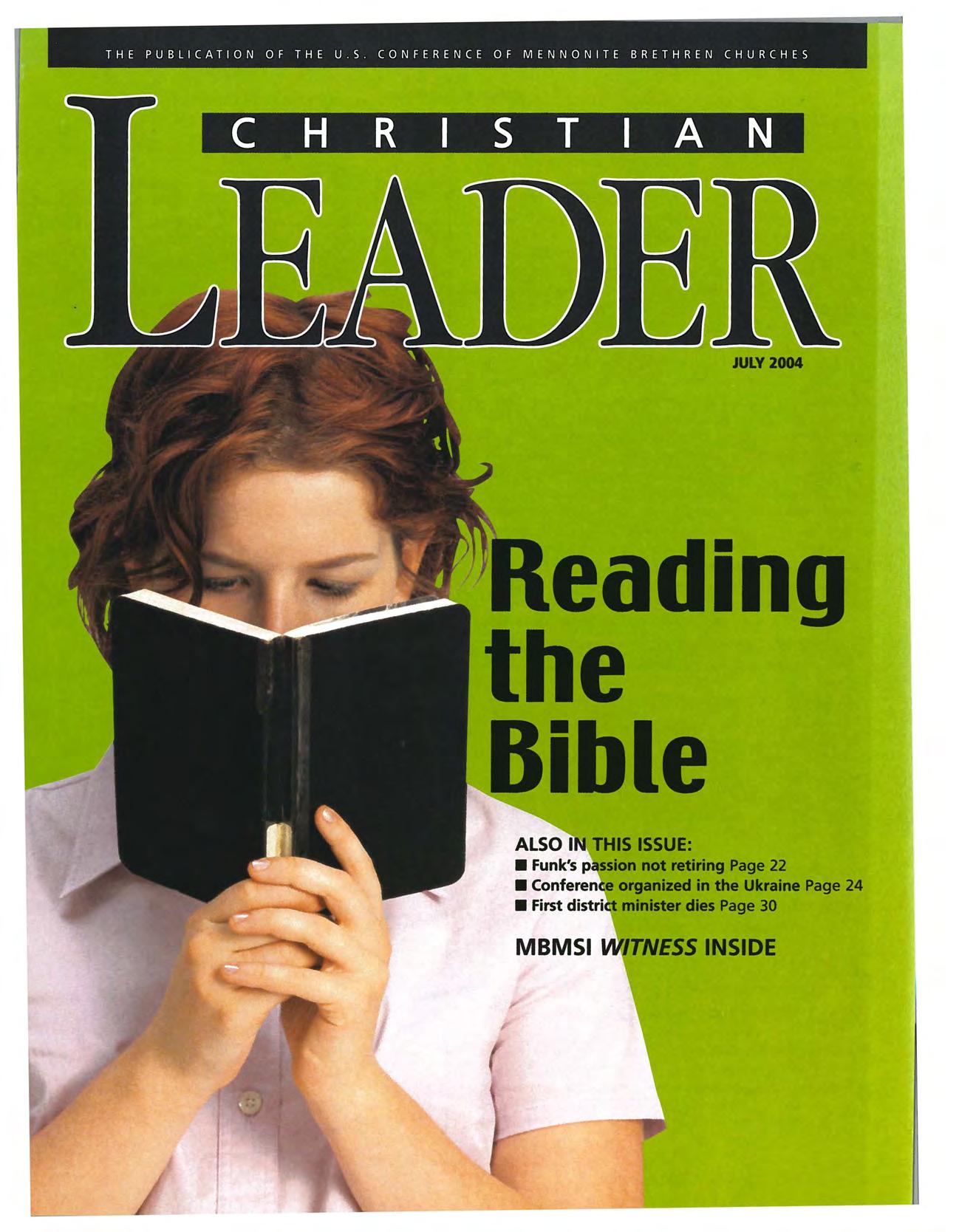
not retiring Page 22 organized in the Ukraine Page 24 rli,,+.i minister dies Page 30



not retiring Page 22 organized in the Ukraine Page 24 rli,,+.i minister dies Page 30

Throughout our history we Mennonite Brethren have said that the Bible is the final authority when it comes to questions of faith and life. This commitment to leading our lives according to what the Bible says is a distinctive of our denomination But the quest to be biblical is not always easy; writes scholar and preacher David Ewert in this issue of the Leader. In an effort to answer why, when we all look to the Bible for guidance on how to live, we come to different conclusions, Ewert works his way through a description of what it means to be biblical.
For D. Merrill Ewert and Otto Ekk the Word of God is most powerful when readers take the Bible personally. Ewert shares how a conversation on a basketball court in Africa changed the way he studies and teaches the Bible. Ekk offers simple but critical guidance for reading and studying the Bible with someone that is still seeking God. My prayer is that we 21st century MBs will continue the tradition of our spiritual forefathers and we too will be "people of the Book."
The news section is filled with a variety of articles about our global family-stories from Europe, Africa and North America. These stories remind us that our God is an awesome God. Thanks to his goodness we have much to celebrate in life. Thanks to his grace we have the strength to make hard choices and navigate difficult and dangerous situations . Thanks to his love we find comfort in sorrow. These stories also remind us that God gave us the church and that through one another we can experience God's goodness, grace and love.
As we wrap one another in arms of prayer, may we continue to see God through and in one another.-CF
An out-of-date list of MB Foundation board members was included with the Foundation ' s convention report published in the June issue of the Leader. Current board members are Ken Neufeld, chair, from Fresno , Calif. ; Lynn Schneider, vice chair, from Huron, S.D.; E. James Enns , secretary, from Fresno; Sherri Baffa, assistant secretary, from Olathe , Kan ; Dale Boese of Salem , Ore.; Reginald Boothe of Wichita , Kan.; Robert Dick of Topeka, Kan.; Angel Flores of Grulla , Tex.; Randy Hamm of Enid , Okla.; Terry Hunt of N. Wilkesboro, N.C.; Andrey Ivantsov of Gig Harbor, Wash. ; Dan Ray of Fresno; and Daryl Toews of Lustre , Mont.
• JULY 21-23, 2004-National pastors' convention, Salt Lake City, Utah
• JULY 23-25, 2004-U S. Conference convention, Salt Lake City, Utah
• JULY 25-26, 2004-55-Plus Conference, Salt Lake City, Utah
• OCT. 28-31, 2004-CentraI District Conference convention, Harvey, N.D.
4

8
Learning that transforms
"Your class is not good," the unhappy student blurts out. Angered, the novice teacher asks why The student's answer comes as quite the shock and leads the young man on a journey of discovery BY D
MERRILL EWERT
Mennonite Brethren are committed to studying and obeyi ng the Bible- it is a hallmark of our denomination. So why do we disagree about what the Bible says? And what do we do about it? BY
DAVID EWERT
When it comes to reading the Bible, how are we Mennonite Brethren similar to other evangelical denominations? How are we different? BY LYNN JOST
12 The power of the Word
A friend of mine is not a Christian and she is interested in read ing the Bible with me. What do I do? Based on his exper ience in a culture with limited scriptural resources, one veteran missionary offers some simple-yet powerful - advice BY one EKK
The story of how Kindred Productions has helped bring the Bible to Low German-speaking people
Ph'lip Side by Philip Wiebe 16
• Getting semi-real
Minds
• When we change our mind about what the Bible says On the Journey.
by Rose Buschman 18 • Stories from the persecuted church Chuck's Co rner by Chuck Buller
•
BOARD OF COM M UNICATIONS: Kathy Heinrichs Wiest, chair; Peggy Goert zen, Reggie Hunt, Phil Neufeld, Moises Tagle, Dalton Reimer
MANDATE: The Christian Leader (lSSN 0009- 5149) is published monthly by the U.S Conference of Mennonite Brethren Churches. The Christian Leader seeks to inform Mennonite Brethren members and churches of the events, activities, decisions and issues of their denomination, and to instruct, inspire and initiate dialogue so members will aspire to be faithful disciples of Christ as understood in the evangelical/Anabaptist theological tradition
EDITORIAL POUCY: The views expressed in this publication do not necessarily represent the position of the Christian Leader, the Board of Communications or the Mennonite Brethren Church. Scr i pture references are from New International Version unless otherwise noted. The editors invite free -lance article submissions A SASE must accompany articles.
READER PARTICIPATION: The editors invite readers to share their thoughts and opinions on topics relevant to the Mennonite Brethren Church using letters to the editor and Forum essays letters to the editor should be brief - 300 words or less - and on one subject. letters must be signed and include the writer's city and state letters will be edited for clarity, appropriateness and length. letters will be published, as space allows, unless marked " Not for publication." Forum is open to members or attendees of Mennonite Brethren churches. Essays should not exceed 800 words, and should include the writer's name, address, home church and occupation
COMMUNICATI ON: All correspondence, including change of address, should be addressed to the Christian Leader, Box 220, Hillsboro, KS 67063 Phone : (620)947-5543 Fax : (620)947-3266. E-mail : christianleader@usmb org.
SUBSCRIPTIONS: Rates as of Aug 1: $18 for one year, $34 for two years and $50 for three years ($20, $38, $54 in Canada) ; $1 50 per copy
M EMBERSHIP: The Christian Leader is a member of the Evangelical Press A sso ci ation and Meetinghouse, an association of Mennonite and Brethren in Chr ist editors
POSTMASTER: Send address changes to the Christian Leader, Box 220, Hillsboro, KS 67063 Periodi cals postage paid at Hillsboro, Kansas

It happened on a dirt basketball court under some pa Im trees on the other side of the world. In less than two minutes, my whole approach to education was turned upside down and my life was set on a new trajectory.
1\vo weeks after graduating from Tabor College in Kansas, I found myself in rural Congo My formal assignment was to manage a feeding program for tuberculosis patients at a Mennonite Brethren mission hospital. When political turmoil disrupted local schools, I also became a part-time math and religion teacher Without
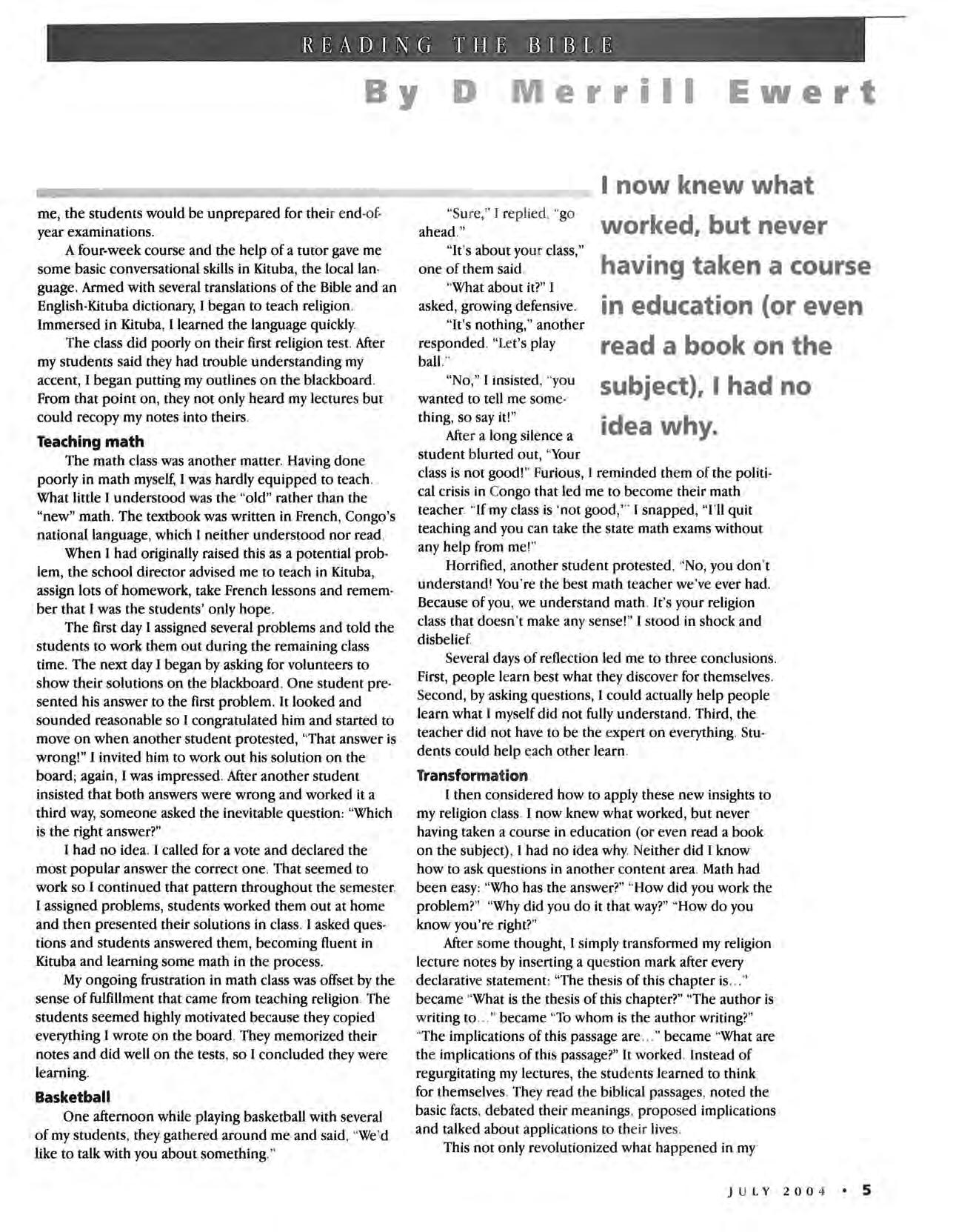
me, the students would be unprepared for thei r e nd -ofyear examinations.
A four-week course and the help of a tutor gave me some basic conversational skills in Kituba, the local language. Armed with several translations of the Bible and an English -Kituba dictionary, I began to teach religion . Immersed in Kituba , I learned the language quickly
The class did poorly on their first religion te st. After my students said they had trouble understanding my accent, I began putting my outlines on the blackboa rd From that point on, they not only heard my lecture s but could recopy my notes into theirs .
The math class was another matter. Having don e poorly in math myself, I was hardly equipped to teach . What little I understood was the "old" rather than the "new" math. The textbook was written in French, Congo's national language , which I neither understood nor read
When I had originally raised this as a potential problem, the school director advised me to teach in Kituba, assign lots of homework, take French lessons and remember that I was the students ' only hope.
The first day I aSSign ed several problems and told the students to work them out during the remaining class time The next day I began by asking for volunteers to show their solutions on the blackboard . One student presented his answer to the first problem. It looked and sounded reasonable so I congratulated him and started to move on when another student protested, "That answer is wrong!" I invited him to work out his solution on the board ; again, I was impressed After another student insisted that both answers were wrong and worked it a third way, someone asked the inevitable question: "Which is the right answer?"
I had no idea I called for a vote and declared the most popular answer the correct one That seemed to work so I continued that pattern throughout the se me ste r. I assigned problems, students worked them out at hom e and then presented their solutions in class I asked questions and students answered them, becoming fluent in Kituba and learning some math in the process.
My ongOing frustration in math class was offset by the sense of fulfillment that cam e from teaching religion The students seemed highly motivated because they copied everything I wrote on the board . They memorized their notes and did well on the tests , so I concluded they were learning
One afternoon whil e p laying basketball with several of my students , th ey gathe re d around me and said , "We ' d like to talk with you about something ."
"Sure ," I re pli e d , "go ahead "
"It 's about yo ur class ," one o f them said . "What about it?" I asked, growing defensive.
"It's nothing, " another responded "Le t's play ball. "
"No," I inSisted , "you wanted to tell me som ething, so say it! "
Aft er a long silence a student b lurted out, "Your
I now knew what worked, but never having taken a course in education (or even read a book on the subject), I had no idea why.
class is not good!' · Furious, I reminded th e m of the political crisis in Congo that led me to become their math teacher "If my class is ' not good, '" I snapped, "I'll quit teaching and you can take the state math exams without any help from me! "
Horrified , another student protested , "No, you don ' t understand! You ' re the best math teacher we 've ever had Because of you , we understand math . It's your religion class that doesn ' t make an y sense! " I stood in shock and disbelie f.
Several days of reflection led me to three conclusions. First, people le arn best what they discover for thems e lves Second, by asking questions, I could actually help people learn what I myself did not fully understand Third, the teacher did not have to be the expert on everything . Students could help ea ch other learn . Transforma t io n
I then considered how to apply these new insights to my religion cl ass I now knew what worked, but never having taken a course in education (o r eve n read a book on the subject) , I had no idea why Neithe r did I know how to ask questions in anothe r content area Math had been easy : "Who has the answer?" "How did you work th e problem?" "Why did you do it that way?" "How do you know you're right? "
Afte r some thought, I simply transformed my religion lecture notes by inserting a qu e stion mark after every declarative statement : "The thesis of this chapter is . . ." b e cam e "What is the thesis of this chapter?" "The author is wr iting to " became "To whom is the author writing? " "The implications of this passage are " became "What are th e implications of this passage?" It worked Instead of regurgitating my lectures, the stud e nts le arned to think for themselves They read the biblical pas sages , noted the basic facts , debated their meanings , propo se d impli cations and talked about applications to th eir live s.
This not only revoluti o nized what happ e ned in my
classroom, it changed my whole approach to leading Bible studies. At the time, I only understood that it worked, not how or why.
In graduate school several years later, I learned that the method I had discovered in desperation has a name: the inductive approach It also has a supporting theory If understood, it can make our Bible studies more effective The rest of this article will suggest how.
Begin by looking to see what a passage saysreviewing context, clarifying facts and identifying key ideas . This ensures everyone shares the same knowledge base and the conversation focuses on the most important ideas. The leader engages learners in a careful review of the passage-identifying key words, recurring themes, central concepts, actions taken, relationships and the like. Oletta Wald's delightfullitde monograph, Tbejoy of Discovery, proposes some very useful questions that can help learners uncover the structure, content and meaning of a passage
Next comes the search for significance Learners discover meaning as they examine key ideas within context. What was the author saying to the original audi-
ence? What did these words mean to those who read them? As learners examine the passage (discussing, debating and constructing arguments), the meanings behind a particular word, phrase, verse or idea become clear
In the third stage, learners connect the passage to their own lives. This involves finding personal applications of the general principles examined during the second phase. If this is what God's Word is saying, what should I do about it? What should I do first?
The leader's role in the inductive process is critical as he or she takes responsibility to shape learning by:
• Creating a good learning environment . Discussions are more effective when learners can comfortably discuss what matters deeply. Leaders should help people get to know each other, care about each other, listen respectfully and openly exchange ideas on subjects over which they may disagree profoundly.
• Building connections. An inductive learning process not only examines the context of a passage, it connects with (and builds upon) what has already been learned. Leaders must see that new ideas and materials
LOOKING FOR A BIBLE study resource written m a Mennonite Brethren perspective? Consider ese resources publishe by Kindred Productions, he publishing ministry of orth American Menno 'te Brethren owne by the Canadian Conti ence.
Word Wise
Designed for unday school class and sm group stud each lesson of the
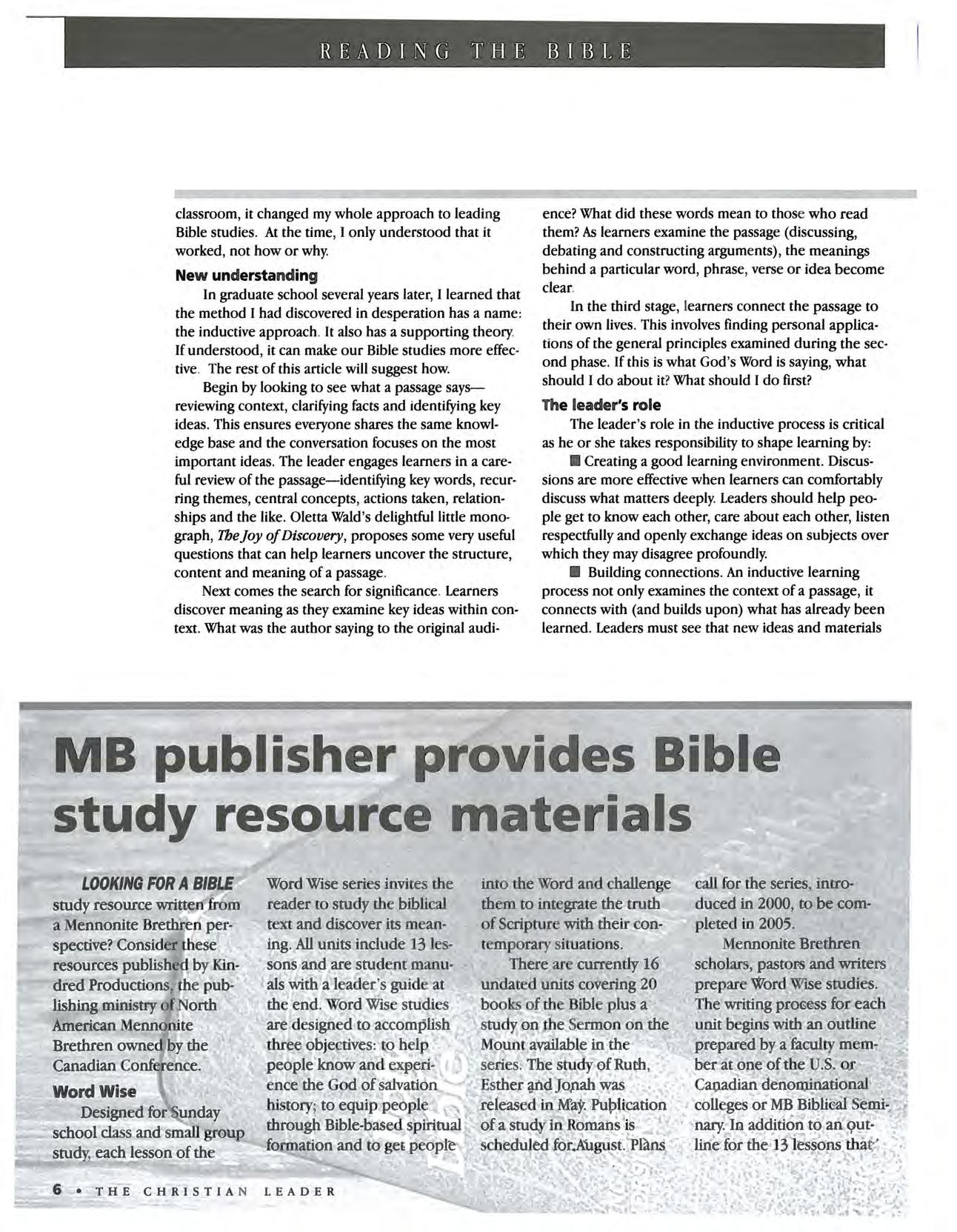
Word Wise series invites the reader to study the biblical text and discover its meaning. All units include 13 lessons and ,are student manu· als with a leaoer 's guide at t the end. Word WISe studies are designed to accomplish three objectives: 0 help people know and extJeri- I ence the God of salvation history; to equip people througp. Bible-based spiritual formation and to get; people
LEADER
into the Word and challenge them to integrate the truth of Scripture with their contemporary situations.
There are currently 16 undated units covering 20 books of the Bible plus a study on the Sermon on the Mount availab\e in the '. series . Th-e study of Rum , Esther ifld Jo.nah was • released in MaY. Pu\J:lication of a study in Romans J is scheduled
call for the series , introduced in 2000, to be completed in 2005.
Mennonite Brethren scholars, pastoFS and writers prepare Word WISe studies. The writing prOG0SS for each unit begins with an outline pre-pared by a faculty meD;lber at one of ti1e U.s. OJ" Cal,)adian denoltlinational colleges or MB BiblieaI • nary. In addition to an 9ut- • , , "'.. , line for the' 13 :
link to previous lessons
• Using questions to guide the conversation . The best inductive Bible studies do not leave discussions to chance Effective leaders prepare by identifying key questions that guide the process through which people review the text , examine its meaning and identify applications.
• Synthesizing Asking questions is not enough. Leaders who ask questions must also help learners take the answers and weave them into conclusions
• Calling for action Too many Bible studies and Sunday school classes never get to application ; they stop after a great discussion. Leaders can help learners put hands and feet on faith by asking questions that lead to action.
Leading inductive Bible studies involves helping learners discover the meaning of passages. Effective leaders ask questions through which participants examine what a passage says, what it means and what we should do about it.
Willing to learn
Over the past three decades, I have led workshops around the world on adult education and community
development. I have seen many community organizers, agricultural extension agents, health workers, Bible study leaders and teachers embrace this problem-posing approach. Some have said it revolutionized their work. Others have opposed it strongly.
Those who are the most confident about what they think they know are usually the most reluctant to accept someone else's knowledge. Even experts must be willing to learn More than any others , they have rejected indigenous knowledge, devalued personal experience and failed to recognize people's capacity to discover ultimate meanings and to apply them to their own lives.
As for me, the lesson learned on that basketball court in Mrica endures. It transformed my approach to Bible study It also taught me humility and gave me faith in people 's capacity to solve their own problems, learn and grow.
D Merrill Ewert is president of Fresno Pacific University, a Mennonite Brethren institution located in Central California. Ewert served with MBMS International from 1967- 1969 and Mennonite Central Committee from 1973 -19 76, spending 1974-76 in Congo.
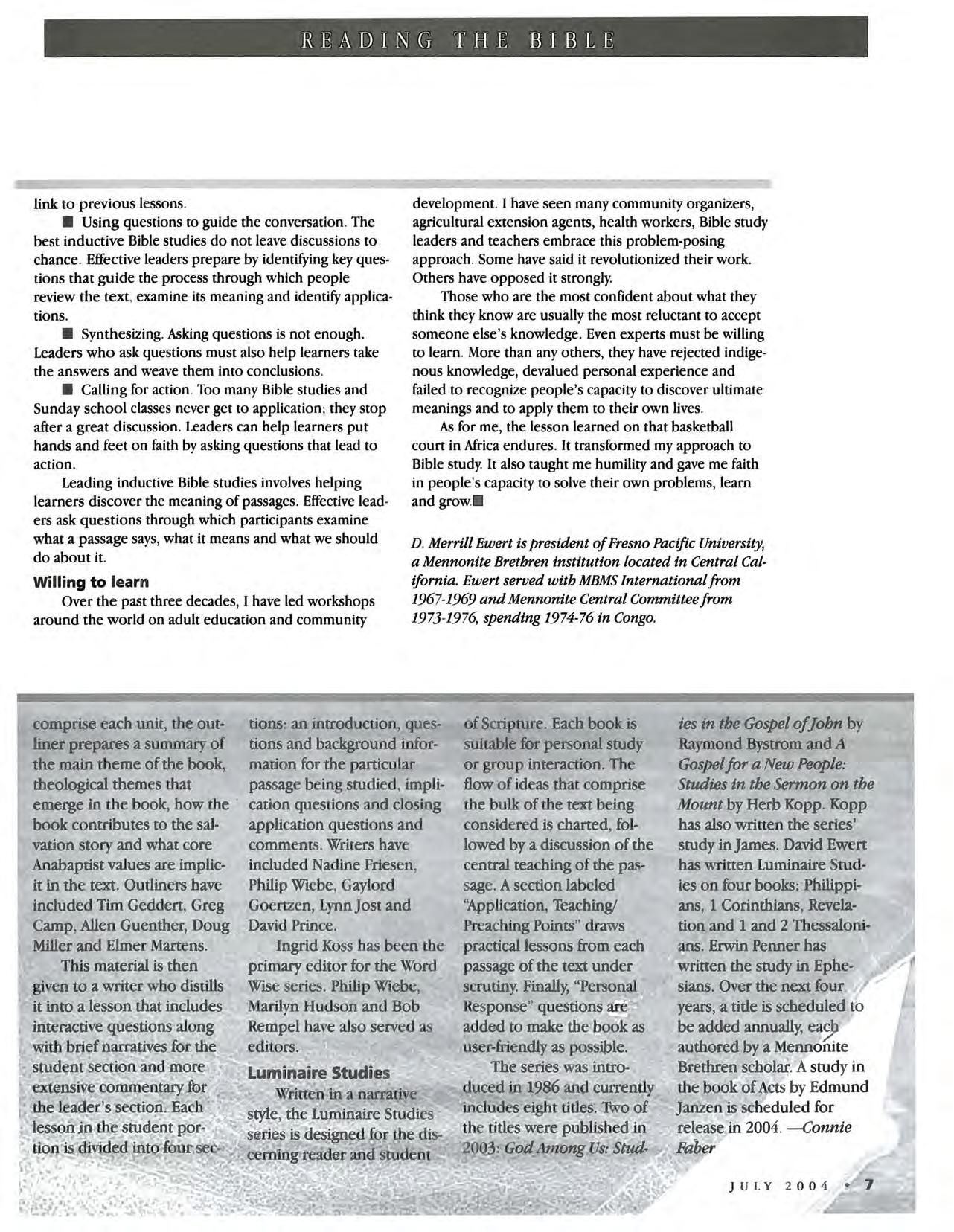
comprise each unit, the outliner prepares a summary of the main theme of the book, theological themes that emerge in the book, how the . book contributes to the salvation story and what core Anabaptist values are implicit in the text. Outliners have included Tim Geddert , Greg Camp, Allen Guenther, Doug Miller an.d Elmer Martens.
This material is then given to a writer who distills it into a lesson that includes
tions: an introduction, questions and background information for the particular passage being studied , implication questions and closing application questions and comments Writers have included Nadine Friesen, Philip Wiebe , Gaylord Goertzen, Lynn Jost and David Prince.
Ingrid Koss has been the primary editor for the Word Wise Series. Philip Wiebe , Marilyn Hudson and Bob Rempel have also served as editors.
Luminaire Studies
of Scripture. Each book is suitable for personal study or group interaction. The flow of ideas that comprise the bulk of the text being considered is charted, followed by a discussion of the central teaching of the passage. A section labeled ')\pplication, Teaching! Preaching Points" draws practical lessons from each passage of the text under scrutiny. Finally, "Personal Response" questions added to make the ook as user-friendly as possi}Jle.
The series was introduced.in 1986 and currently includes eight titles. lWo of the titles were publishedJn .20Q3 : God.Anfong Us: Stidl-
ies In the Gospel ofjohn by Raymond Bystrom and A Gospel for a New People: Studies in the Sermon on the Mount by Herb Kopp. Kopp has also written the series' study in James. David Ewert has written Luminaire Studies on four books: Philippians , 1 Corinthians, Revelation and 1 and 2 Thessalonians. Erwin Penner has written the study in Ephesians. Over the next four years, a tide is scheduled to be added annually, authored by a Mennonite Brethren scholar. A study in the book of Acts by Edmund JanZen is scHe dule d for release in 2004. -Connie
Mennonite Brethren have been known as "people of the Book." So if we are committed to studying and obeying the Bible, why
do we disagree about what the Bible says?
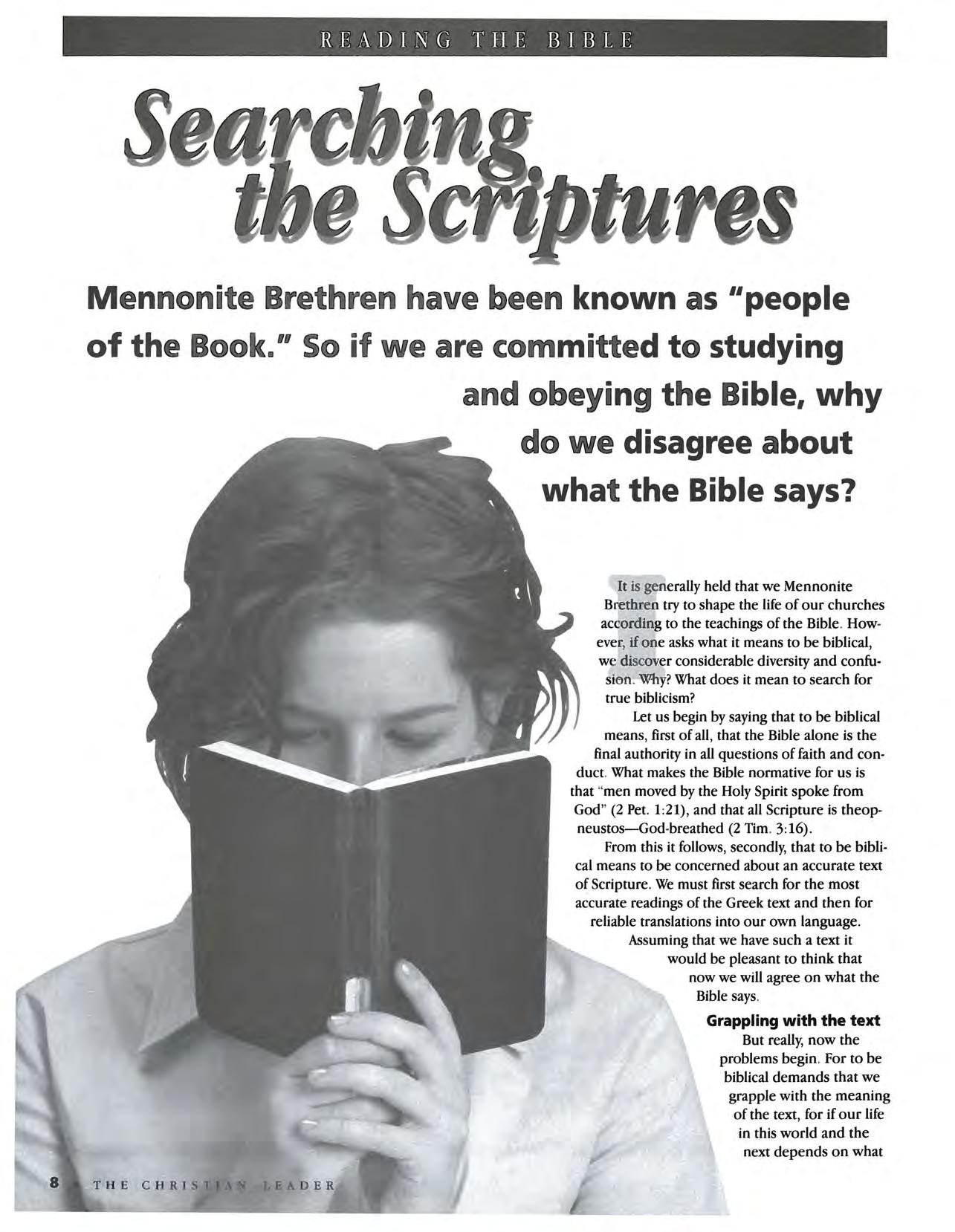
It is gen erally held that we Mennonite Brethre n try to shape the life of our churches ac cording to the teachings of the Bible . Howeve r, if on e asks what it means to be biblical, we discover considerable diversity and confusian Why ? What does it mean to search for true biblicism?
Let us begin by saying that to be biblical means, first of all, that the Bible alone is the final authority in all questions of faith and conduct What makes the Bible normative for us is that "men moved by the Holy Spirit spoke from God " (2 Pet. 1:21), and that all Scripture is theopneustos-God -breathed (2 Tim 3 :16).
From this it follows, secondly, that to be biblical means to be concerned about an accurate text of Scripture. We must first search for the most accurate readings of the Greek text and then for reliable translations into our own language. Assuming that we have such a text it would be pleasant to think that now we will agree on what the Bible says
Grappling with the text
But really, now the problems begin For to be biblical demands that we grapple with the meaning of the text, for if our life in this world and the next depends on what
the Bible says , then we must be greatly concerned to he ar the message correctly Sound prinCiples of interpretation should guide our efforts to correctly hear the Bible 's message . I will mention two su ch principles .
First, we should discover what the original writer intended to convey. But that meaning pre ci sely is not always easy to define I have heard it said, wh ere differences of interpretation were debated, "The Bible means what it says, and says what it means " No doubt about that! But you and I do not always know what it means (and sometimes not even what it says) . And the matter becomes very acute when we equate our own understanding of a text with the Word of God itself. Not only does it make us intolerant and close our minds to new light, it tempts us to stamp those who disagre e with us as heretics
Second, we should interpret the Old Testament in light of the New Testament. The New Testament affirms that in Jesus Christ God 's revelation received its capstone New Testament writers, who were steeped in Old Testament thought, saw a continuity in God 's plan of salvation and so recast many of the Old Testament promises given to Israel and applied them to the new people of God . Without going into the question further, suffice it to say that the relationship of the Old Testament to the New is probably still one of the most crucial areas of hermeneutic debate
Making the leap
But even if we should agree that a given text in the Bible has a certain meaning , we may disagree considerably as to whether that me aning had temporal significance or whether it is binding universally. This calls for discernment between what is temporal and what is p e rmanent, between the cultural dress in which the original message appeared and the shape it takes today How shall we transfer the message of a first century book into the 21st century? Let me mention several ways without passing judgment on the merits of any of them
One way is to universalize . What would happen if all believers universalized Jesus ' command to the ri ch young ruler to sell everything, give it to the poor and to follow Christ? Romans 13 has often been read in isolation of th e rest of the New Testament and universalized, leading Christians to submit to the demands of the state regardless of what the state demanded What would have happened during Hitler's regime if the churches had read not only Romans 13 but also Revelation 13, where the state has become beastly and believers refuse to re spond to its blandishments? However, to isolate Revelation 13 and to universalize it would also be wrong, of course
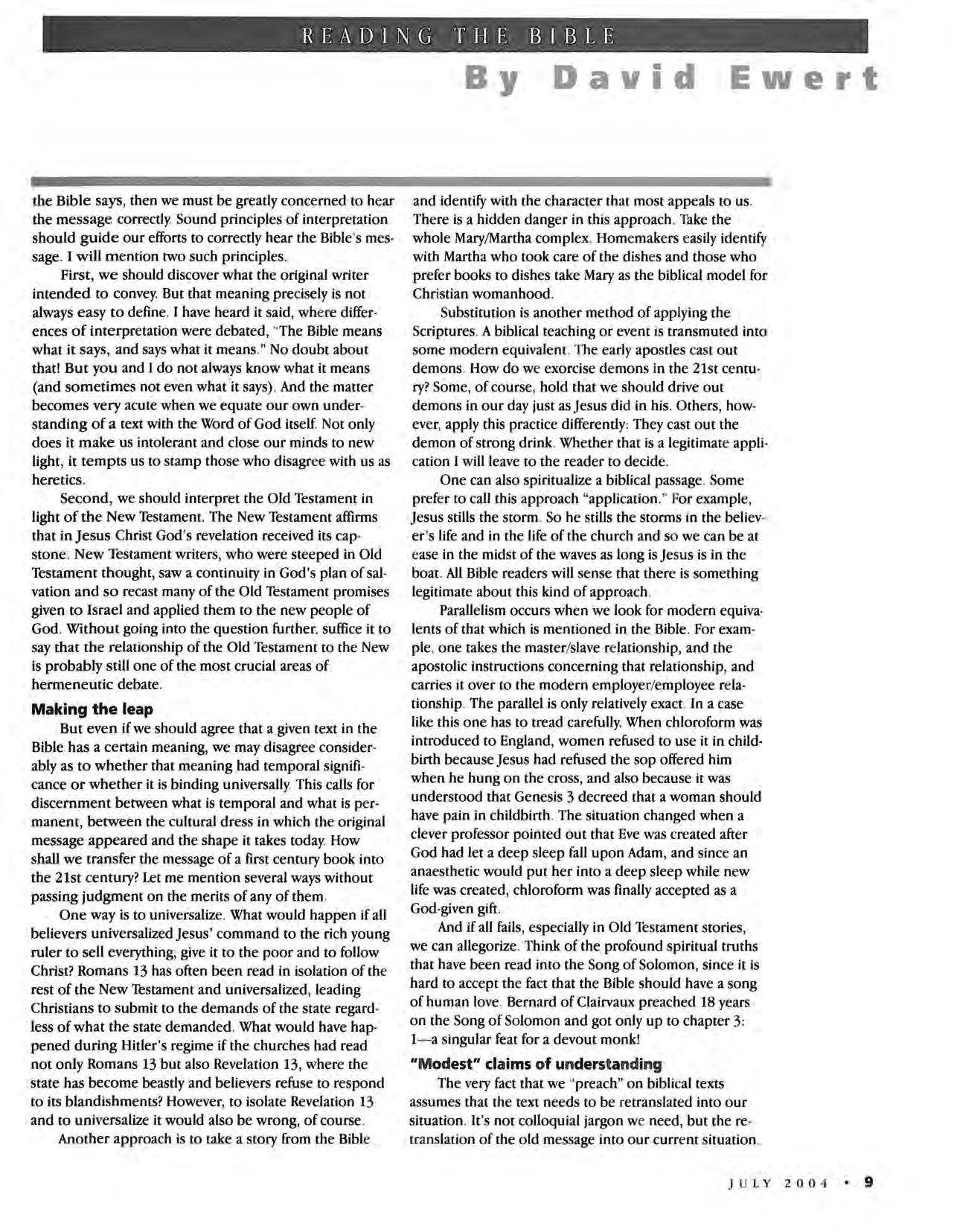
Another approach is to take a story from the Bible
and identify with the character that most appeals to us There is a hidden danger in th is approach . Take the whole Mary/Martha complex . Hom e make rs e asily identify with Martha who took care of the d ish e s and those who prefer books to dishes take Mary as the biblical model for Chr istian womanhood
Substitution is another method of app lying the Scriptures A biblical teaching or event is transmuted into some mod e rn eqUivalent . The early apostles cast out demons . How do we exorcise d e mons in the 21st century? Some , of course , hold that we sho u ld drive out demons in our day just as Jesus di d in his. Others , howeve r, apply this practice differently: They cast out the demon of strong drink. Whether that is a legitimate application I will leave to the reader to decide.
One can also spiritualize a biblical passage . Some prefe r to call this a p p roach "application " For example, Jesus stills the storm So he stills the storms in the believer ' s life and in the life of the church and so we can be at e ase in the midst of the waves as long is Je su s is in the boat. All Bible readers will sense that there is something legitimate about this kind of approach .
Parallelism occurs when we look for modern equivalents of that which is mentioned in the Bible For example , one takes the master/slave r e lationship, and the apostolic instructions concerning that relationship, and carries it over to the modern employe r/employee relationship The parallel is only relatively exact. In a case like this one has to tread carefully. When chloroform was introduced to England , women refused to use it in childbirth because Jesus had refused the sop offered him when he hung on the cross, and also because it was understood that Genesis 3 decreed that a woman should have pain in childbirth . The situation changed when a clever professor pointed out that Eve was created after God had let a deep sleep fall upon Adam , and sinc e an anaesthetic would put her into a deep sleep while new life was created, chloroform was finally accepted as a God -given gift.
And if all fails, especially in Old Testament stories , we can allegorize . Think of the profound spiritual truths that have been read into the Song of Solomon , since it is hard to accept th e fact that the Bible should have a song of human love . Bernard of Clairvaux preached 18 years on the Song of So lomon and got only up to chapter 3 : I - a singular feat for a devout monk!
" M odest" claims of underst a nd ing
The very fact that we "preach" on bibli cal texts assumes that the text needs to be retranslated into our situation It's not colloquial jargon we need, but the retran slation of the old message into our curre nt situation
However we face some problems making the leap from the first to the 21st century
First, there is the semantic problem Semantics has to do with meaning, signification and nuances of words. I read of a man who read the Bible and then ran to his wife shouting that God had healed his heart. And he meant that quite literally, for he had a heart problem "How do you know, David?" asked his wife "The Lord says so right here in the Psalm. 'My heart is fixed, 0 God, my heart is fixed '"
Now whether the Lord had in fact healed his heart I do not know, but I know that the psalmist did not have physical healing in mind. The same words can mean different things to different people, and that's another dimension of semantics A word or phrase does not real-
Iy mean very much until it is put into a specific context. Another problem is that of cultural differences . Let us take the practice of women wearing a head covering when they go to church on the grounds of 1 Cor. 11 : 116. Did Paul really want a Near Eastern custom to be perpetuated for all times in the different cultures of this world? There were people in the Crimea in the 19th century who were known as Brotbrecher (breadbreakers) , for they wanted to imitate literally what our Lord did at meals when he broke bread The knife could be used to cut up other foods but not bread-that had to be broken But all they were doing was imitating a first century custom.
There is a tribe in Africa that has no experience with rivers and boats and so instead of saying that Christ is an anchor for our souls their Bible reads, Christ is the "picketing peg" for our souls These people raise cattle and tie them to stakes driven into the ground
To be biblical, then, means that we must find 21st century equivalents both in terms of language and culture if the truths of the New Testament are to come across to us authentically. And this we must do not in order to avoid the demands of the New Testament, but because we take them seriously.
There are, then, numerous problems as we try to make the leap from the first to the 21st century and so we should be modest in our claims to have understood the SCriptures correctly and to have bridged the tempo-
MENNONITE BRETHREN
SHARE with Protestant reformers like Martin Luther the formula sola scriptura, sola fide: the Bible alone , faith alone. Like Luther, early Anabaptist Bible students were expert in reading the Bible in their originallanguages and they agreed that the Bible should be translated into the com -
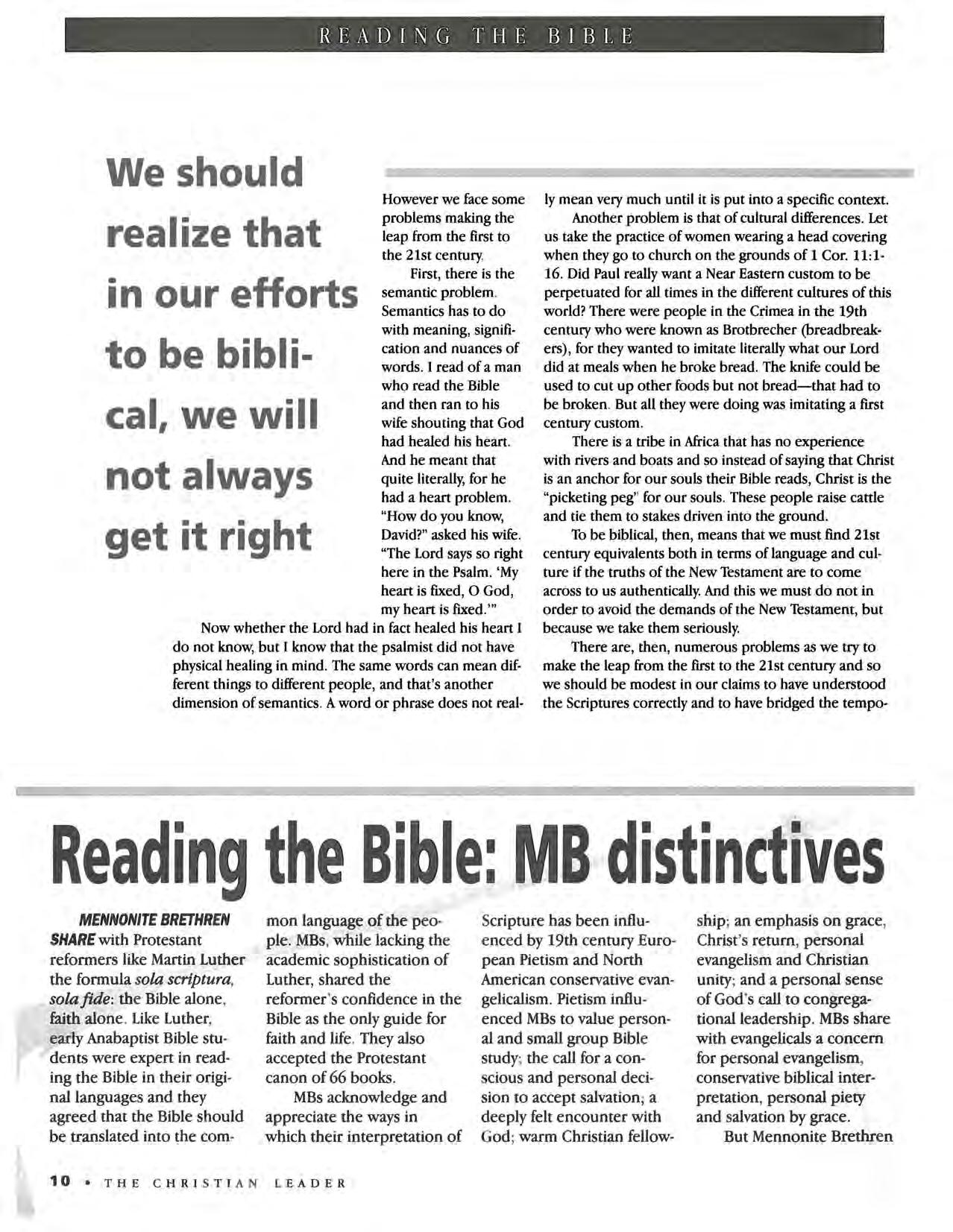
mon language of the people. MBs , while lacking the academic sophistication of Luther, shared the reformer ' s confidence in the Bible as the only guide for faith and life They also accepted the Protestant canon of 66 books
MBs acknowledge and appreciate the ways in which their interpretation of
Scripture has been influenced by 19th century European Pietism and North American conservative evangelicalism. Pietism influenced MBs to value personal and small group Bible study ; the call for a conscious and personal decision to accept salvation; a deeply felt encounter with God ; warm Christian fellow-
ship ; an emphasis on grace , Christ ' s return , personal evangelism and Christian unity ; and a personal sense of God ' s call to congregationalleadership. MBs share with evangelicals a concern for personal evangelism , conservative biblical interpretation , personal piety and salvation by grace. But Mennonite Brethren
ral and cultural gap of many centuries appropriately Ethical questions
The Bible does not directly answer some questions we may have Bible readers do violence to the Scriptures when they make it speak to issues that did not concern the biblical writers in their day
Take for example the matter of divorce and remarriage . Jesus and Paul make it explicitly clear that divorce is wrong and sinful, as does the Old Testament. But what if it happens? If there is forgiveness for sins such as murder and adultery, then surely there is forgiveness for the sin of divorce But does forgiveness mean also the freedom to remarry in every case?
At this point we wish we had more information. The divorce texts do not help us much here since they condemn divorce but do not speak to the practical questions of what the church is to do when it happens. Perhaps then our answer will have to come from the Gospel as a whole, which is good news for those who have failed and are in need of forgiveness and restoration
When we come to the many ethical issues which the believer has to deal with from time to time, issues not addressed directly in the Bible , we must seek to understand the basic strands of biblical ethics and then seek to apply these to new situations as these emerge
And so we should not be too upset if we as a denomination took a pOSition on a particular ethical question in the past and now take a different position. We should
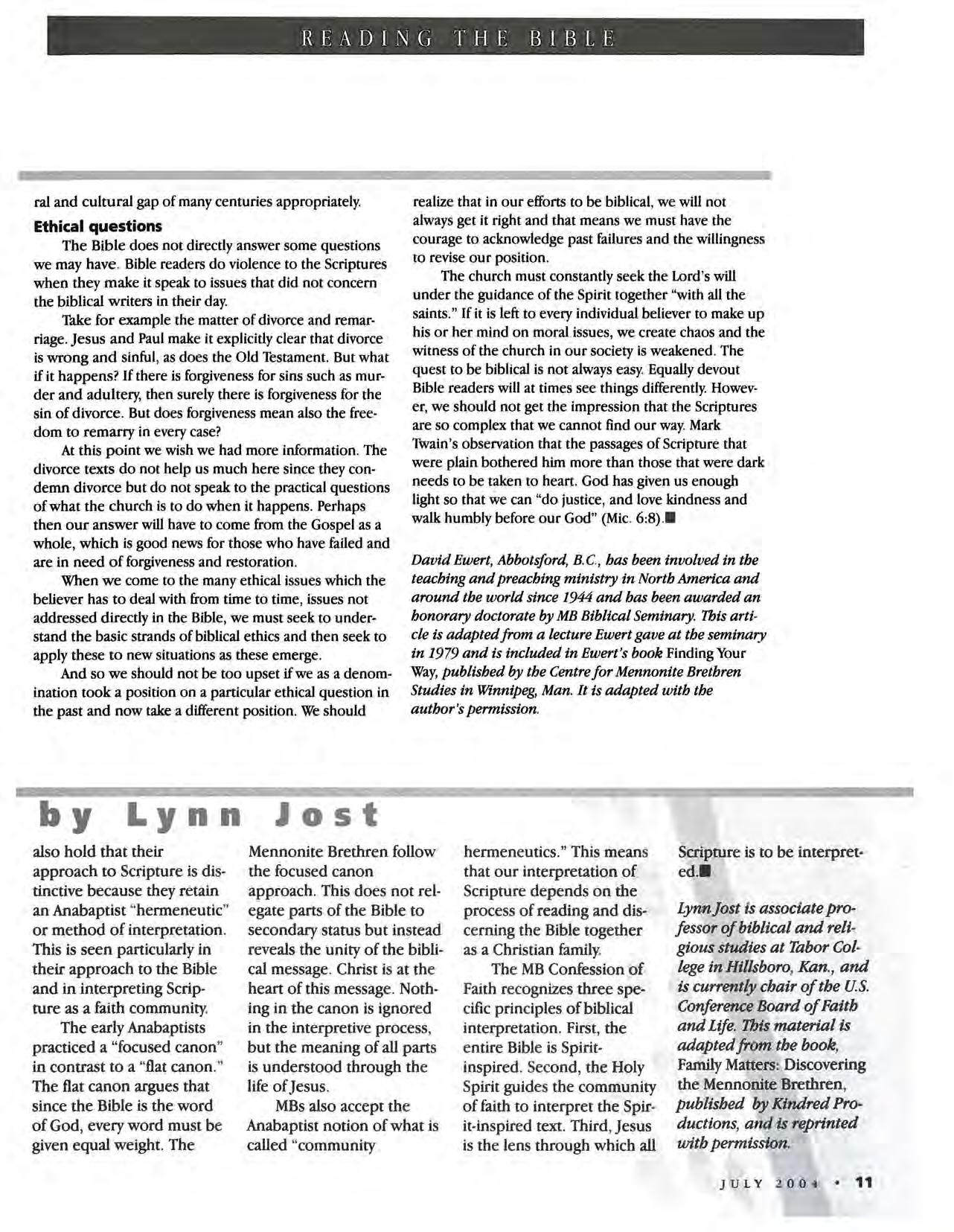
by Lynn Jost
also hold that their approach to Scripture is distinctive because they retain an Anabaptist "hermeneutic " or method of interpretation This is seen particularly in their approach to the Bible and in interpreting Scripture as a faith community.
The early Anabaptists practiced a "focused canon" in contrast to a "flat canon ." The flat canon argues that since the Bible is the word of God, every word must be given equal weight. The
realize that in our efforts to be biblical, we will not always get it right and that means we must have the courage to acknowledge past failures and the willingness to revise our position.
The church must constantly seek the Lord's will under the guidance of the Spirit together "with all th e saints." If it is left to every individual believer to make up his or her mind on moral issues , we create chaos and the witness of the church in our society is weakened . The quest to be biblical is not always easy. Equally devout Bible readers will at times see things differently. However, we should not get the impression that the Scriptures are so complex that we cannot find our way Mark Twain's observation that the passages of Scripture that were plain bothered him more than those that were dark needs to be taken to heart God has given us enough light so that we can "do justice , and love kindness and walk humbly before our God" (Mic . 6 :8) .•
David Ewert, Abbotsford, B. C. , has been involved in the teaching and preaching ministry in North America and around the world since 1944 and has been awarded an honorary doctorate by MB Biblical Seminary This article is adapted from a lecture Ewert gave at the seminary in 1979 and is included in Ewert's book Finding Your Way, published by the Centre for Mennonite Brethren Studies in Winnipeg, Man. It is adapted with the author's permission
Mennonite Brethren follow the focused canon approach. This does not relegate parts of the Bible to secondary status but instead reveals the unity of the biblical message Christ is at the heart ofthis message. Nothing in the canon is ignored in the interpretive process , but the meaning of all parts is understood through the life of Jesus
MBs also accept the Anabaptist notion of what is called "community
hermeneutics ." This means that our interpretation of Scripture depends on the process of reading and disce rning the Bible together as a Christian family
The MB Confession of Faith recognizes three specific principles of biblical interpretation. First, the entire Bible is Spiritinspired Second, the Holy Spirit guides the community of faith to interpret the Spirit-inspired text Third , Jesus is the lens through which all
Scripture is to be interpreted .•
LynnJost is associate professor of biblical and religious studies at Tabor College in Hillsboro, Kan., and is currently chair of the u.s. Conference Board ofFaith and Life This material is adapted from the book, Family Matters: Discovering the Mennonite Brethren , published by Kindred Productions, and is reprinted with permission.
Looking for advice on how to read the Bible with some-
one who is not a Christian? Consider this simple, powerful approach.
Wh e n it come to r eading and studying the Bible, my exp€ rie nce is one of tremendous contrasts
Bo t h Marjorie and I were raised in very devout Christian homes where w:e heard many Bible stories One of my favorites in tlie Old Testament was the story of Joseph and his coat of ma ny colors while little Zacchaeus and his treeclimbing took t he prize in the New Testament. Our parents took Bible reading very serious and it was only many years later in seminary that I realized I had had Basic Christianity 101 sitting on the lap of my father and mother
While living in California, if I was to study the Biblea certain topiC or subject on a personal level or in a
MENNONITE BRETHREN have historically believed that people should read the Bible in their own language and that the Bible should be translated into the common language of the people.
Over the years , that belief has prompted MB involvement in a variety of Bible translation endeavors , including a recent project to translate Scripture into the common-but never officially recognized-Germanic language used by many Mennonites.
Low German , also known as Low Saxon or Plautdietsch , is
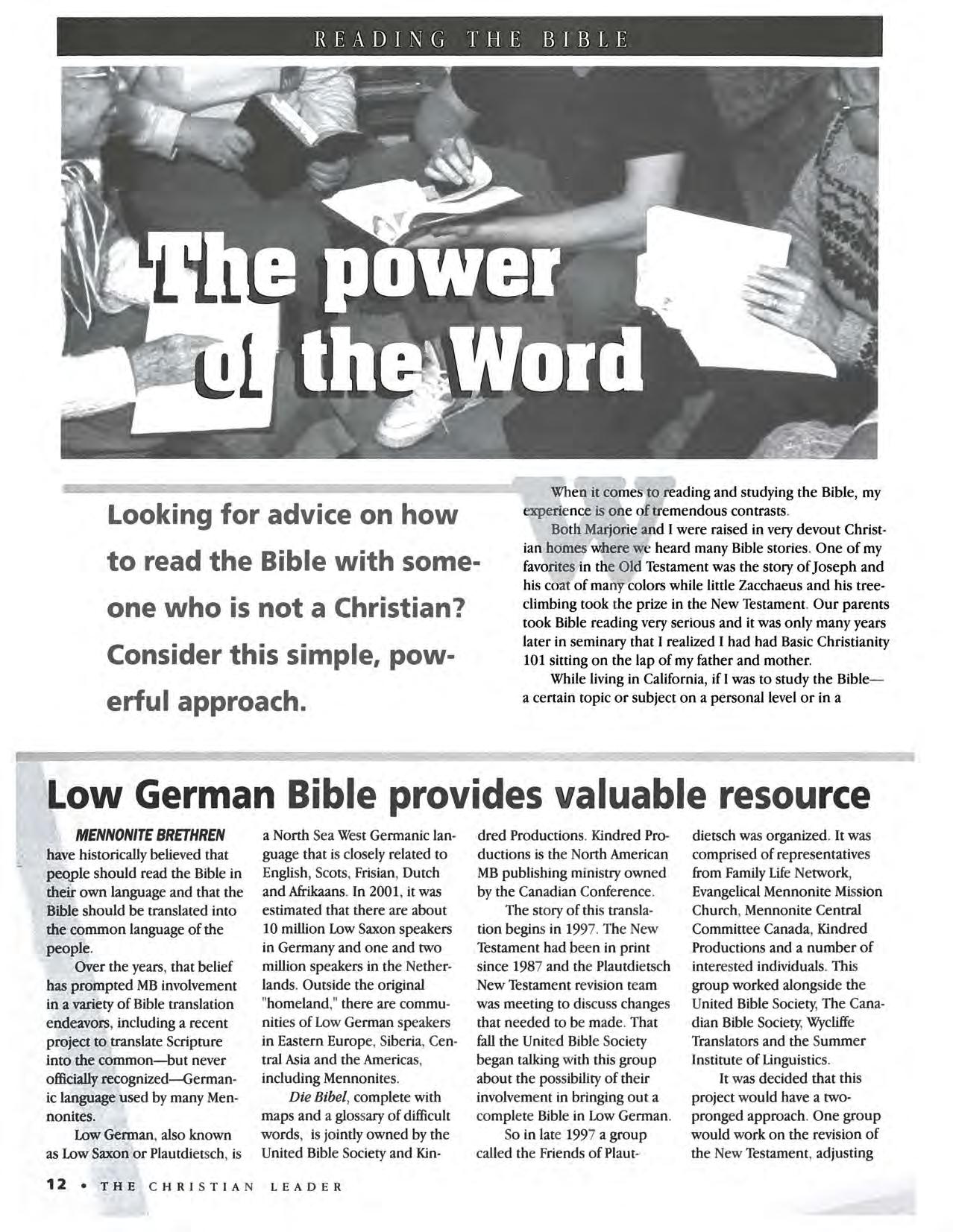
a North Sea West Germanic language that is closely related to English, Scots , Frisian , Dutch and Afrikaans In 2001 , it was estimated that there are about 10 million Low Saxon speakers in Germany and one and two million speakers in the Netherlands Outside the original "homeland ," there are communities of Low German speakers in Eastern Europe , Siberia , Central Asia and the Americas , including Mennonites
Die Bibel , complete with maps and a glos sary of difficult words, is jointly owned by the United Bible Society and Kin-
12 • THE CHRISTIAN LEADER
dred Productions . Kindred Productions is the North American MB publishing ministry owned by the Canadian Conference
The story of this translation begins in 199 7. The New Testament had been in print since 1987 and the Plautdietsch New Testament revision team was meeting to discuss changes that needed to be made . That fall the United Bible Society began talking with this group about the possibility of their involvement in bringing out a complete Bible in Low German .
So in late 1997 a group called the Friends of Plaut-
dietsch was organized . It was comprised of representatives from Family Life Network, Evangelical Mennonite Mission Church , Mennonite Central Committee Canada, Kindred Productions and a number of intere sted individuals This group worked alongside the United Bible Society, The Canadian Bible Society, Wycliffe Translators and the Summer Institute of Linguistics
It was decided that this project would have a twopronged approach One group would work on the revision of the New Testament , adjusting
group-the first thing I would do is go to the local Ch r istian bookstore There I would find resources beyond my imagination- so much variety that I would need to secure the assistance of the resident expert to help me figure out which would be most suited for our particular setting.
For the past 15 years we have lived in Portugal helping to pioneer the Mennonite Brethren work in this country Although we had traveled in a number of countries and even worked as short-term missionaries in Brazil, we had no idea what awaited us in our new adopted home.
We went from a situation in the U S where there was a glut of stuff in regards to Bible translations and s tudy materials, to a world where there was very little When we arrived in Portugal, the country had only one serious Bible translation of its own- and that from the King James era- and a few poorer translations that often had a strong Latin Vulgate influence So we were pushed and pressed from all sides to look for a different model of Bible study than what the U S context with all its resources had offered us .
Over the past five years or so there has been an incredible increase in the production of various translations and study Bibles here in Portugal. But the early years impacted our life and the approach we have taken to reading the Bible with both seekers and Christians .
When we stepped off the plane in January 1989, I was contacted immed ia tely by a man who indicated that the previous missionary had studied the Bible with him , and he wanted to continue this process (He's now a church member of many years along with his Wife )
"Well ," I thought, "this is great! I'm getting off the plane with a master of divinity in my pocket. What more could there be?"
After the first few studies it became very clear to me that I did not need to prepare a long-wind e d sermon for each verse we studied Being willing to read Scripture with someone who had read very little in the Bible was the issue As we read the Scripture, I learned to know our great God and experienced the power of the Good News of salvation in new and powerful ways .
The power of the Gospel is unique, and we need to be willing to allow it to take preeminence in our s tudy of it. One of my seminary professors would start ea ch lecture period with five to ten minutes of Bible reading No comment before, no comment after Only the pure Scripture Coming from a person with not just one but two doctorates, this told me something.
Only many years into our work here in Portugal has that example unfolded itself more and more By now both Marjorie and I are sold on simply reading Scripture with people , whether in a group or indiVidually, with someone who is searching for God, new in the faith or

the orthography to coincide The Canadian and United vocabulary, s ince Low German in Bolivia Three different with the orthography being Bible Societies offered much like most languages is a fluid organizations in Germany are used in the Old Testament expertise and financial support language distributing in that country. translation work. It would also to this project , says Marilyn Six years after that initial Individuals and ministries in use the German Bible as the Hudson , Kindred Production meeting, 5000 copies of the Paraguay, Mexico and Manitoba base for translation instead of manager. A Plautdietsch spell Low German Bible rolled off the regularly distribute Bibles To the English Bible that was u sed checker was developed , orthog- presses As soon as the Bibles date , Hudson reports that just in the first translation raphy and grammar guidelines were available , Kindred and under 3000 Bibles have found
The second prong was to established and a word list of other distributors began ship- their way into the hands of Low ask Ed Zacharias , who was all the Plautdietsch words used ping them around the globe , German speaking people. already working on his own to in the draft translation was with the first shipment going to "It is our prayer as, the translate the Old Testament, to drawn up and refined Once Mexico. The Canadian Bible Bible comes into the hands of complete his translation the revisions and translating Society ordered a supply and Low Getman speaking people Zacharias began translating the were complete , readers fluent Wycliffe is distributing through that many will come to know Old Testament about 10 years in the chosen variant of Plaut- their channels. The Unite d and love the God of both the ago as a hobby when he was dietsch read the Scriptures and Bible Society released the news Old and the New Testaments ," serving in Mexico. In order to suggested needed changes. The to their chapters around the says Hudson.-KP and The devote more time to the trans- translation was tested for aecu- world Campus Crusade for Chronicle, a publication of the lation , Zacharias left his work as racy, consistency in style , Christ in Winnipeg bOUght Chortitz er Mennonite Confera miss ionary. spelling, readability and use of some 400 Bibles for distribution ence

with someone who has walked with Jesus for many years. One small group that meets on Friday nights has intentionally been lead in this way over many years This has forced the participants to be serious partakers in the search for the precious wealth of the word of God. Over the last years, people have accepted Jesus, and we have been privileged to read the Bible with these new "People of the Way "
Try it some day. Simply read Scripture in your local Sunday school class with no comments and no study guide. Just read the Word for others to hear, and you may experience a new depth to the Gospel you never before realized.
Am I suggesting that we just read the Bible with people? No! Preparation is necessary. This approach is not devoid of preparation, of study, of searching all serious sources in order to be the best at reading Scripture. As leaders, we study the passage ahead of time and encourage the participant to also study the passage.
In our context a very good practical and academic preparation is essential for a missionary. Coming to the European context, the worker should have a good understanding of the culture, the history and geography of the country and the foundational philosophy that drives the core values, decision making process and thought patterns of the people . Preparation allows the leader to focus on the most pertinent issues, and helps the seeker stay on track.
Here in Portugal I teach occasionally at the local Bible school. One piece of advice that I give to all my students, that I got from an influential MB Biblical Seminary professor some years ago, is to not give in too qUickly to buying the largest and most complete commentary series. Rather, have on hand various Bible translations, even in other languages if you are so blessed to read other languages. And I tell my students to acquire a very good Portuguese dictionary-in North America it would be an English dictionary
We should not be so eager to have someone else tell us what we should understand. We need to allow the Word to speak to us and to then share with others. Scripture is there to be studied, and in that process the very Spirit of God will lead us and others in our understanding.
As you can tell, I am not advocating that the way to dig deeper into God's riches for us is to close our eyes, let the Bible fall open and point to a text. If the reading is very focused, the group can have a discussion and
there is a serious foundation to it. Only if the reading is very focused can the group have a discussion that is based on Scripture and not so much on what each individual may feel that particular day. The leader still has the daunting task of shepherding the individual or group, pointing out dangers, traps and false paths. Yet since this is done in community, the dialogue and comprehension will be much more profound.
Simply reading Scripture with not too many comments especially works with skeptical seekers This way one does not get caught up in many philosophies, theologies and theories. Trying to defend or refute everything around us is impossible because as soon as we think we have argued the last great argument, a new one will crop up. Scripture speaks for itself much more than we would like to give it credit. When shopping for your next Bible study help, I encourage you to make sure that what you are buying is really helping you understand Scripture better and deeper, not just aiding the propagation of a market that seems quite muddled by now.
Marjorie and I believe in preparation, in deepening our understanding of the text and the context, be that the biblical context or the current one. But we have found simply reading is the most powerful tool in a culture where the true gospel of Jesus and his saving power has been distorted and blurred for centuries with theories, twisted theologies and fatalistic philosophies giving way to a very depressed, oppressed and downtrodden people who are confused as to what is and what is not of God.
So the next time you run into a person seeking more from God, I invite you to go to the Source. You will have "holy fun" reading of power, mercy, love, reconciliation and salvation with a person that may never have experienced any of these. Together you will grow in the knowledge of the Gospel, and you-yes you-will be an instrument that allows the Holy Spirit to unleash the transforming power ofjesus in a person who simply was seeking to know a bit more about God .•
Otto Ekk with his wife Marjorie minister in Portugal as MBMS International workers. The Ekks lead an emerging church in the outskirts of Lisbon and, along with other projects, are giving leadership and vision for two more church plants. The family's home congregation is Dinuba (Calif) MB Church Darrin, the youngest of the couple's three children, lives with his parents
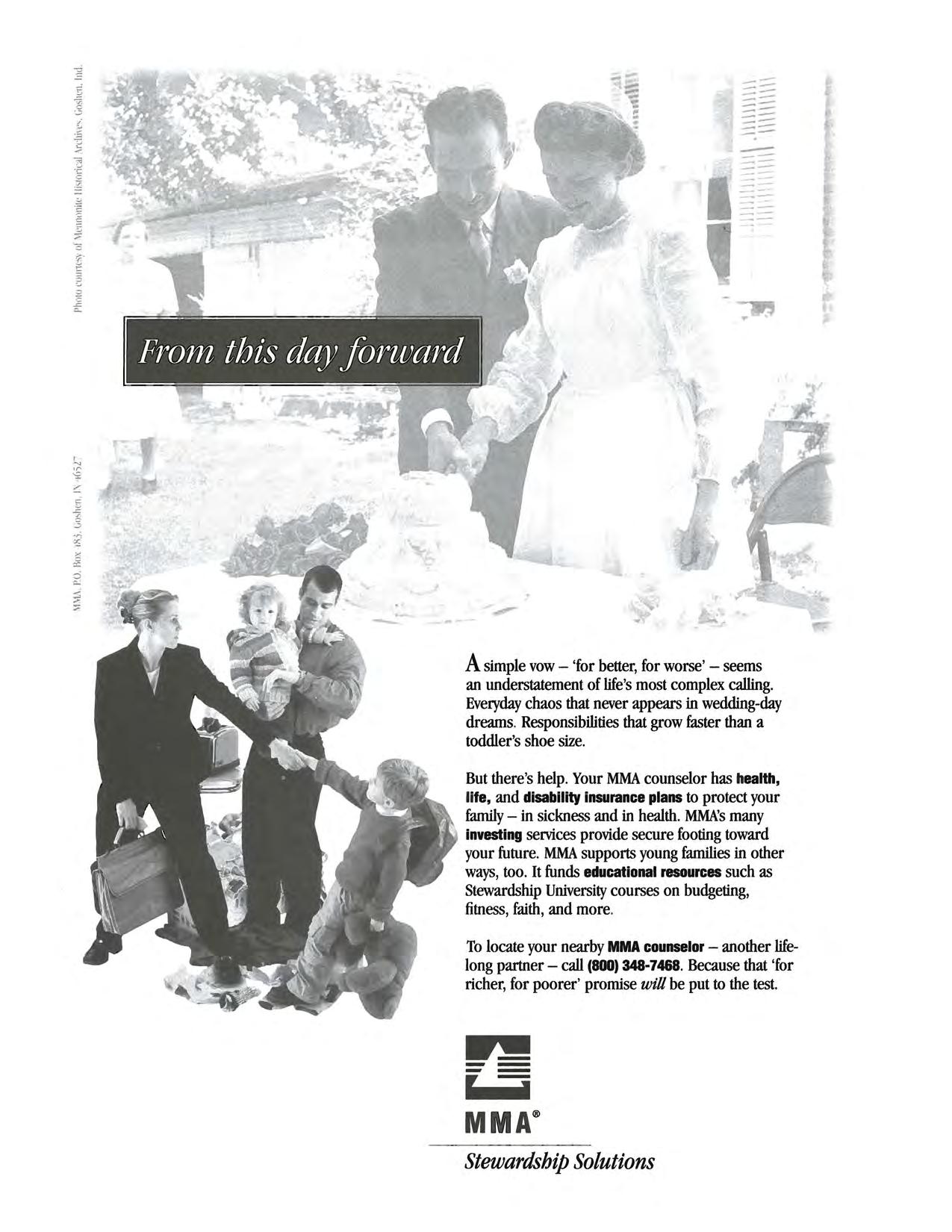
Asimple vow - 'for better, for worse' - seems an understatement of life's most complex calling. Everyday chaos that never appears in wedding-day dreams . Responsibilities that grow faster than a toddler's shoe size.
But there's help. Your MMA counselor has health, life, and disability insurance plans to protect your family - in sickness and in health. MMA's many investing services provide secure footing toward your future. MMA supports young families in other ways, too It funds educational resources such as Stewardship University courses on budgeting, fitness, faith, and more
To locate your nearby MMA counselor - another lifelong partner - call (.) 348-7468. Because that 'for richer, for poorer' promise wiD be put to the test.
BY PHILIP WIEBE
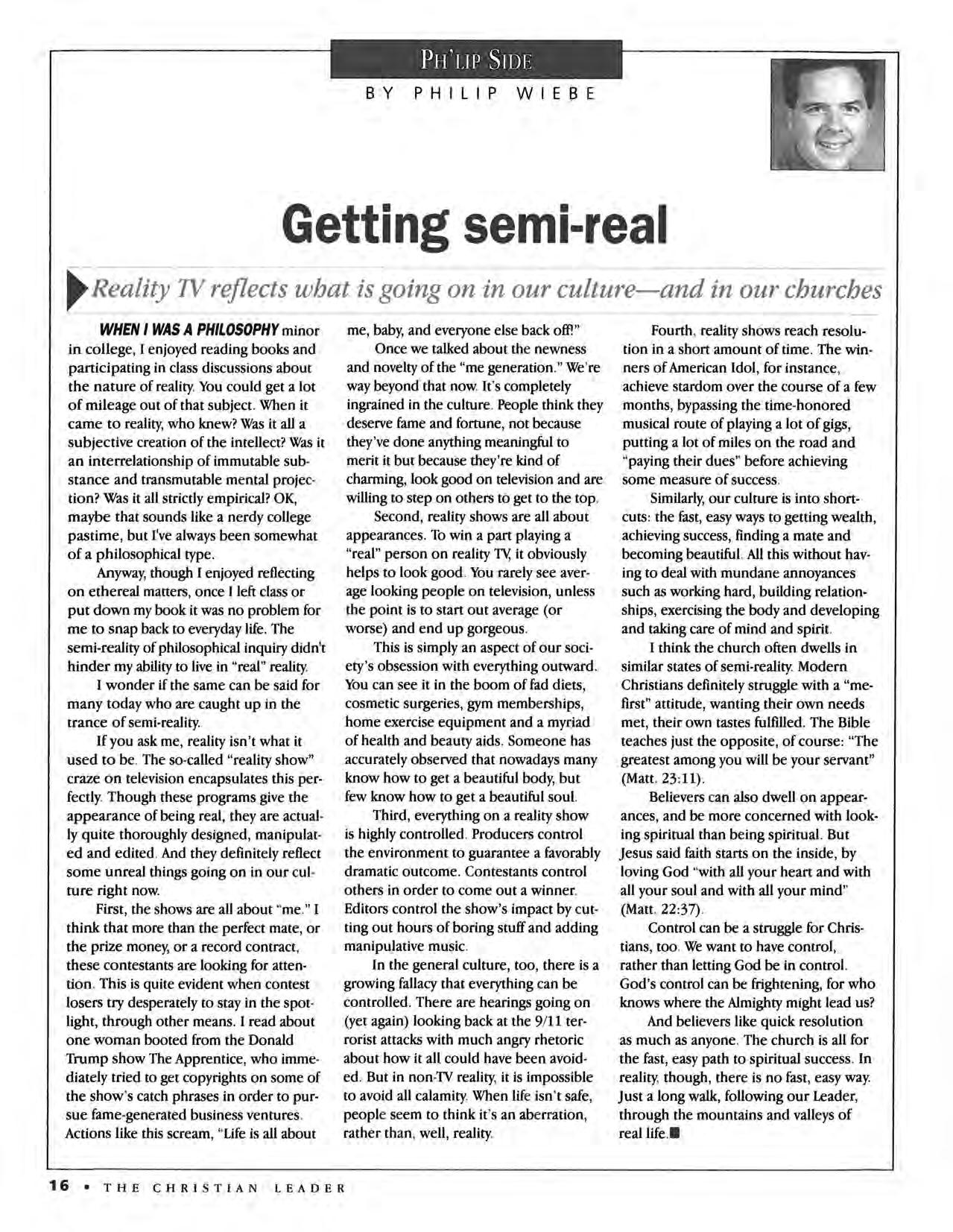
WHEN I WAS A PHILOSOPHY minor in college, I enjoyed reading books and participating in class discussions about the nature of reality You could get a lot of mileage out of that subject When it came to reality, who knew? Was it all a subjective creation of the intellect? Was it an interrelationship of immutable substance and transmutable me ntal projection? Was it all strictly empirical? OK, maybe that sounds like a nerdy college pastime, but I've always been somewhat of a philosophical type.
Anyway, though I enjoyed reflecting on ethereal matters, once I left class or put down my book it was no problem for me to snap back to everyday life. The semi-reality of philosophical inquiry didn't hinder my ability to live in "real " reality.
I wonder if the same can be said for many today who are caught up in the trance of semi-reality.
If you ask me, reality isn't what it used to be The so -called "reality show" craze on television encapsulates this perfectly. Though these programs give the appearance of being real , they are actually quite thoroughly design e d, manipulated and edited And they definitely reflect some unreal things going on in our culture right now.
First, the shows are all about "me ." I think that more than the perfect mate, or the prize money, or a record contract , these contestants are looking for attention . This is quite evident when contest losers try desperately to stay in the spotlight, through other means. I read about one woman booted from the Donald Trump show The Apprentice, who immediately tried to get copyrights on some of the show 's catch phrases in order to pursue fame -generated business ventures Actions like this scream, "Life is all about
me, baby, and everyone else back oID"
Once we talked about th e newness and novelty of the "me generation " We 're way beyond that now. It 's completely ingrained in the culture . People think they deserve fame and fortune, not because they've done anything meaningful to merit it but because they're kind of charming, look good on television and are willing to step on others to get to the top .
Second, reality shows are all about appearances. To win a part playing a "real" person on reality Tv, it obviously helps to look good You rarely see average looking people on television, unless the point is to start out average (or worse) and end up gorgeous .
This is simply an aspect of our soci- . ety's obsession with everything outward. You can see it in the boom of fad diets, cosmetic surgeries, gym memberships, home exercise equipment and a myriad of health and beauty aids . Someone has accurately observed that nowadays many know how to get a beautiful body, but few know how to get a beautiful soul.
Third, everything on a reality show is highly controlled . Producers control the environment to guarantee a favorably dramatic outcome. Contestants control others in order to come out a winner Editors control the show ' s impact by c utting out hours of boring stuff and adding manipulative music .
In the general culture, too, there is a growing fallacy that everything can be controlled. There are hearings going on (yet again) looking back at the 9/ 11 terrorist attacks with much angry rhetoric about how it all could have been avoided But in non -TV reality, it is impossible to avoid all calamity When life isn ' t safe, people se em to think it 's an abe rr ation, rather th a n , well, reality.
Fourth , reality shows reach resolution in a short amount of time . The winners of American Idol, for instance , achieve stardom over the course of a few months, bypassing the time-honored musical route of playing a lot of gigs , putting a lot of miles on the road and "paying their dues " before achieving some measure of success .
Similarly, our culture is into shortcuts: the fast, easy ways to getting wealth, achieving success, finding a mate and becoming beautiful. All this without having to deal with mundane annoyances such as working hard, building relationships, exercising the body and developing and taking care of mind and spirit.
I think the church often dwells in similar states of semi-reality. Modern Christians definitely struggle with a "mefirst" attitude, wanting their own needs met, their own tastes fulfilled The Bible teaches just the opposite, of course: "The greatest among you will be your servant" (Matt 23: 11)
Believers can also dwell on appearances, and be more concerned with looking spiritual than being spiritual. But Jesus said faith starts on the inside, by loving God "With all your heart and with all your soul and with all your mind " (Matt . 22:37) .
Control can be a struggle for Christians, too We want to have control, rather than letting God be in control. God's control can be frightening, for who knows where the Almighty might lead us?
And believers like quick resolution as much as anyone The church is all for the fast, easy path to spiritual success In reality, though, there is no fast, easy way. Just a long walk, following our Leader, through the mountains and valleys of real life •
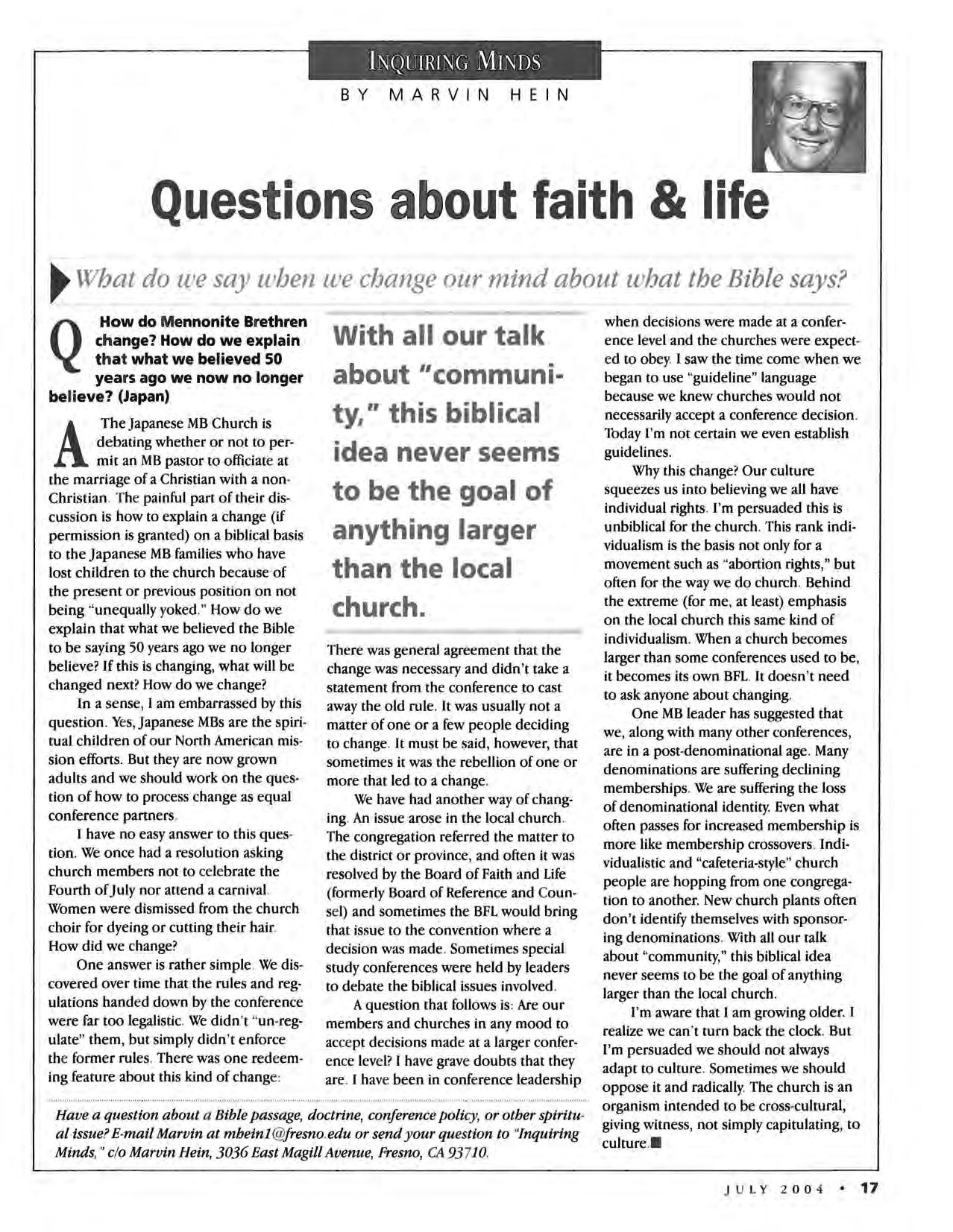
BY MARVIN HEIN
QHow do M ennonite Brethren ch ange? How do we explain t h a t what we believed 50 years ago we now no longer be li eve? (Japan)
AThe Japanese MB Church is debating whether or not to permit an MB pastor to officiat e at the marriage of a Christian with a nonChristian The painful part of their discus sion is how to explain a change (if permission is grante d) on a biblical basis to the Japanese MB families who have lost children to the church be cause of the present or previous pOSition on not being "unequally yoked " How do we explain that what we believed the Bible to be saying 50 years ago we no longer believe? If this is changing, what will be changed next? How do we change?
In a sense, I am embarrassed by this question Ye s, Japanese MBs are the spiritual children of our North American mission efforts . But they are now grown adults and we should work on the qu e stion of how to process change as equal conference partners
I have no easy answer to this question . We once had a resolution asking church members not to ce le brate the Fourth oOuly nor attend a carnival. Women were dismissed from the church choir for dyeing or cutting their hair How did we change?
One answer is rather simple . We discovered over time that the rules and regulations hand e d down by the conference were far too legalistic We didn ' t "un -regulate" them, but simply didn ' t enforce th e former rules There was one red e eming feature about this kind of change :
all
about "community," this biblical idea never seems to be the goal of anything larger than the local church.
There was general agreem e nt that the change was necessary and didn ' t take a statement from the conference to cast away the old rule It was usually not a matter of one or a few people deciding to change . It must be said , however, that sometimes it was the rebellion of one or more that led to a change
We have had another way of changing An issue arose in the local church The congregation referred the matter to the district or province , and often it was resolved by the Board of Faith and Life (formerly Board of Reference and Counse l) and sometimes the BFL would bring that issue to the convention where a decision was made . Sometimes special study conferences were held by leaders to debate the biblical issues involved
A question that follows is : Are our members and churches in any mood to ac ce pt decisions mad e at a larger conferen ce leve l? I have gr ave doubts that they are I have been in confe rence leadership doctrine, conference policy, or other spiritual issue? E-mail Marv in at mheinl @f resno edu or send y our qu estion to "Inquiring Minds," c/o Marvin Hein, 3036 East Magill Avenue, Fresno, CA 9371 0
when decisions were made at a confer-
ence level and the churches were expect -
e d to obey I saw the time com e when we began to use "guideline" language because we knew churches would not necessarily accept a conference decision . Today I'm not certain we even establish guidelines
Why this change? Our culture squeezes us into believing we all have individual rights . I'm persuaded this is unbiblical for the church . This rank individualism is the basis not only for a movement such as "abortion rights, " but often for the way we do church Behind the extreme (for me , at least) emphasis on the local church this same kind of individualism When a church becomes larger than some conferences used to be, it becomes its own BFL. It doesn't need to ask anyone about changing
One MB leader has suggested that we, along with many other conferences, are in a post-denominational age Many denominations are suffering declining memberships We are suffering the loss of denominational identity. Even what often passes for increased membership is more like membership crossovers Individualistic and "cafeteria-style " church people are hopping from one congregation to another New church plants often don't identify themselves with sponsoring denominations . With all our talk about "community," this biblical idea never seems to be the goal of anything larger than the local church
I'm aware that I am growing older. I realize we can ' t turn back the clock. But I'm persuaded we should not always adapt to culture Sometimes we should oppose it and radically The church is an organism intended to be cross -cultural, giving witness , not simply capitulating, to culture •

BY ROSE BUSCHMAN
On a trip this spring I had the opportunity to visit the headquarters of Voice of the Martyrs, an organization that specializes in keeping track of what is happening to persecuted Christians around the world While there I talked with a man who had recently been to China and who told me about a Christian pastor he met while there. This pastor leads a house church in China that is not officially affiliated with the state church and is, therefore, illegal. He has already been jailed more than 20 times for his preaching and evangelizing activities .
This pastor carries with him at all times a "prison bag" containing clothes and other supplies he will need when arrested During a recent confrontation the police who came to get him were dumbfounded to learn that he was packed and ready to go to jail. This pastor is committed to following Jesus and is well prepared to accept the consequences of doing so
During his most recent time in prison the pastor packaged strings of Christmas lights. He was required to meet a quota with the threat of serious punishment if he did not. "I worked hard and always met my quota," he told the visiting mission official.
With tears in his eyes, this official said to me, "I don't know if I have that kind of commitment to my Lord. I can only marvel at the dedication of these Chinese Christians ."
I remember reading somewhere that when a person comes to the Lord in China other Christians rejoice and say, "Now Jesus has another pair of hands to serve him "
With such dedication and commitment, no wonder the Christian church in China is growing by leaps and bounds.
By the way, the Christmas lights this pastor was packing are sold here in the U S. through major discount department
stores . So the next time you purchase some inexpensive Christmas lights marked "Made in China," remember that they just might have been assembled by a Chinese Christian in jail for his faith.
The most recent news from Christians in Iraq is encouraging . Bibles and Christian literature are being distributed and evangelizing among the Muslim population is continuing Voice of the Martyrs reports that "there has been talk about a two-year window of opportunity for Christians in Iraq. Now it appears that window may close faster than anyone predicted ."
I was deeply moved by the testimony of one Iraqi Christian, Timotheous who was imprisoned under the previous regime and tortured for his faith. "They killed many, many people here, but God was with us in this place Persecution and pain are good for believers. God is in control.. When believers learn to share the gospel in prison , it will be very easy to share the gospel outside with the simple ordinary people."
Joseph, another Iraqi also previously imprisoned for his faith, says "Persecution is terrible But in the time of persecution there is a power . .. .We are not to be afraid of anything because the Bible says, in the time of persecution, there is grace " Joseph says he will continue to preach the gospel. He is ready to spend the rest of his life in jail or to even die for his faith . "This is normal, " he says, "because in jail is blessing. You can preach in jail."
Then there is the story of To Dinh Trung, an evangelist in Vietnam arrested in 1995 and severely beaten by communist police officers after he was in custody. Eventually there was a trial and he was sentenced to several years in jail. His ministry continued, this time to fellow inmates in prison, and soon many came
.
Through the efforts of a letter writing campaign by Christians from around the world, the officials eventually decided to give him an early release from prison . However, by that time there were so many Christians in the jail that Trung refused. He chose to serve his full sentence He felt he needed to stay in jail and minister there to this group of new believers The writer of the article I read asks, "How many more faces will we see in heaven because of his dedication?"
We need to support Christians around the world who are suffering for their faith The Bible says, "Remember those in p'rison as if you were their fellow prisoners, and those who are mistreated as if you yourselves were suffering" (Heb . 13:3). We can do this by praying for our persecuted brothers and sisters We can also write letters of encouragement to them. Furthermore, we can write letters of respectful protest to their governments asking for better treatment and religious freedom for Christians in their countries
There is a new Web site, persecution.com, which contains information and addresses and gives a lot of valuable adVice on how to do this. According to the Web site, "authorities in many nations are very sensitive about their image abroad When they realize that outsiders are monitoring a prisoner's situation, conditions may be improved."
And for the prisoner, the Web site states, "When a prisoner learns others are protesting on their behalf or when they receive your letter, they know that someone cares."
We can do something and we should Tonight I wrote four letters and tomorrow I will mail them If enough of us do this we will make a difference. Will you join me ?
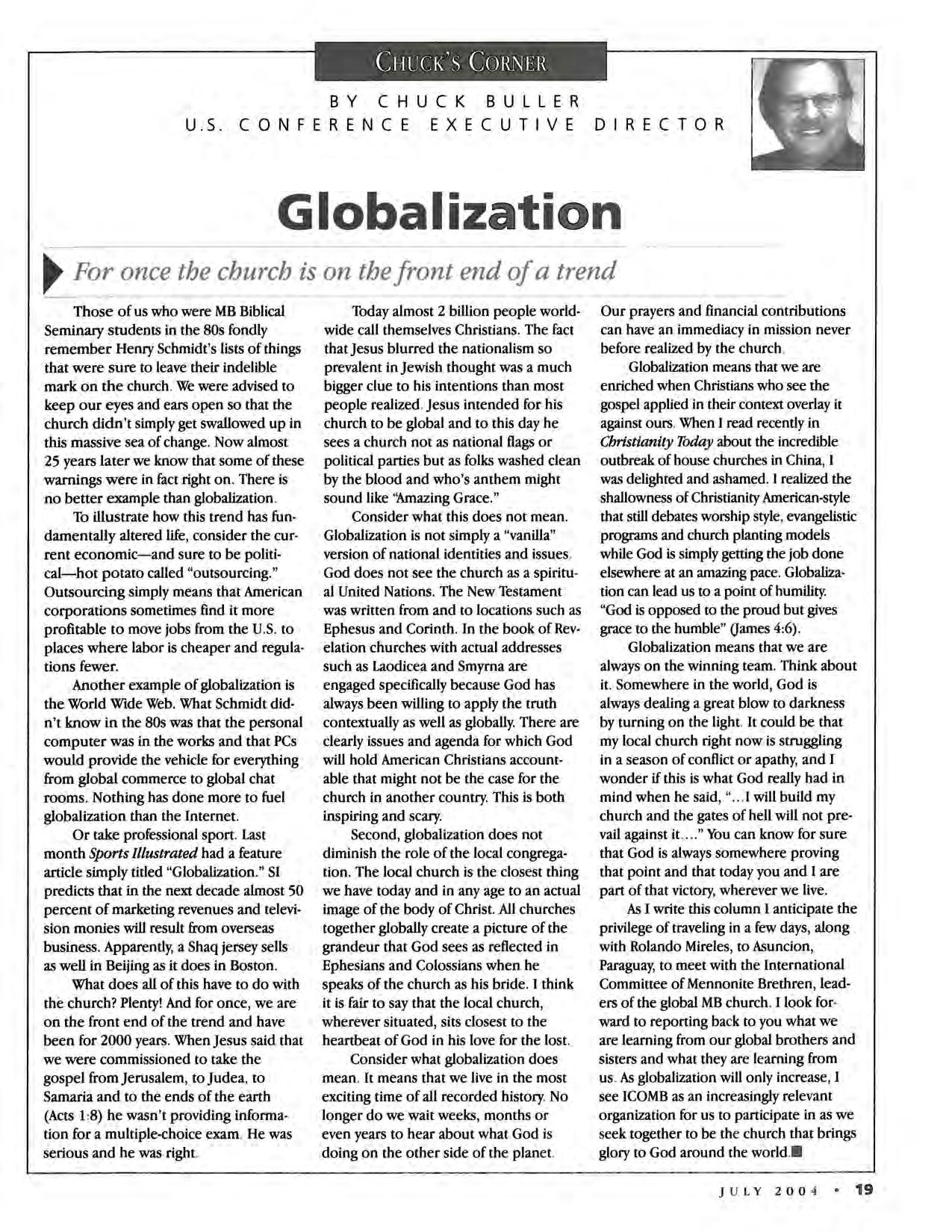
BY CHUCK BULLER U.S. CONFERENCE EXECUTIVE DIRECTOR
Those of us who were MB Biblical Seminary students in the 80s fondly remember Henry Schmidt's lists of things that were sure to leave their indelible mark on the church We were advised to keep our eyes and ears open so that the church didn't simply get swallowed up in this massive sea of change Now almost 25 years later we know that some of these warnings were in fact right on. There is no better example than globalization
To illustrate how this trend has fundamentally altered life, consider the current economic- and sure to be political-hot potato called "outsourcing." Outsourcing simply means that American corporations sometimes find it more profitable to move jobs from the U.S to places where labor is cheaper and regulations fewer.
Another example of globalization is the World Wide Web. What Schmidt didn't know in the 80s was that the personal computer was in the works and that PCs would provide the vehicle for everything from global commerce to global chat rooms . Nothing has done more to fuel globalization than the Internet.
Or take professional sport Last month Sports Illustrated had a feature article simply titled "Globalization." SI predicts that in the next decade almost 50 percent of marketing revenues and television monies will result from overseas business. Apparently, a Shaq jersey sells as well in Beijing as it does in Boston.
What does all of this have to do with the church? Plenty! And for once, we are on the front end of the trend and have been for 2000 years. When Jesus said that we were commissioned to take the gospel from Jerusalem, to Judea , to Samaria and to the ends of the earth (Acts 1:8) he wasn't providing information for a multiple-choice exam He was serious and he was right.
Today almost 2 billion people worldwide call themselves Christians. The fact that Jesus blurred the nationalism so prevalent in Jewish thought was a much bigger clue to his intentions than most people realized . Jesus intended for his church to be global and to this day he sees a church not as national flags or political parties but as folks washed clean by the blood and who's anthem might sound like Grace."
Consider what this does not mean. Globalization is not simply a "vanilla" version of national identities and issues God does not see the church as a spiritual United Nations. The New Testament was written from and to locations such as Ephesus and Corinth. In the book of Revelation churches with actual addresses such as Laodicea and Smyrna are engaged specifically because God has always been willing to apply the truth contextually as well as globally. There are clearly issues and agenda for which God will hold American Christians accountable that might not be the case for the church in another country. This is both inspiring and scary.
Second, globalization does not diminish the role of the local congregation. The local church is the closest thing we have today and in any age to an actual image of the body of Christ. All churches together globally create a picture of the grandeur that God sees as reflected in Ephesians and Colossians when he speaks of the church as his bride. I think it is fair to say that the local church, wherever situated, sits closest to the heartbeat of God in his love for the lost. Consider what globalization does mean It means that we live in the most exciting time of all recorded history. No longer do we wait weeks, months or even years to hear about what God is doing on the other side of the planet.
Our prayers and financial contributions can have an immediacy in mission never before realized by the church
Globalization means that we are enriched when Christians who see the gospel applied in their context overlay it against ours . When I read recently in Christianity Today about the incredible outbreak of house churches in China, I was delighted and ashamed. I realized the shallowness of Christianity American-style that still debates worship style , evangelistic programs and church planting models while God is Simply getting the job done elsewhere at an amazing pace. Globalization can lead us to a point of humility. "God is opposed to the proud but gives grace to the humble" Oames 4:6).
Globalization means that we are always on the winning team. Think about it. Somewhere in the world, God is always dealing a great blow to darkness by turning on the light. It could be that my local church right now is struggling in a season of conflict or apathy, and I wonder if this is what God really had in mind when he said, " I will build my church and the gates of hell will not prevail against it. ... " You can know for sure that God is always somewhere proving that point and that today you and I are part of that victory, wherever we live.
As I write this column I anticipate the privilege of traveling in a few days, along with Rolando Mireles, to Asuncion, Paraguay, to meet with the International Committee of Mennonite Brethren, leaders of the global MB church. I look forward to reporting back to you what we are learning from our global brothers and sisters and what they are learning from us As globalization will only increase, I see ICOMB as an increasingly relevant organization for us to participate in as we seek together to be th e church that brings glory to God around the world .•
Editor's note: This article first appeared in a German evangelical magazine, Idea Spektrum, in April. It was reprinted in Mennoblatt, a Mennonit e publication in Paraguay and translated for Mennonite Weekly Review where it was published May 31 The family's last name is not given. References to dates ( "eight months ago") reflect the original publication.
Whoever sees twins Lea and Tabeaistornbetween d e light and horror : They are conjoined twins, born
eight months ago in Mi.inster, Germany, attached at the head
Their parents, Nelly and Peter, Russian-born German Mennonites , have embraced the children, though doctors recommended an abortion Nelly and Peter have no doubt that abortion is against God's will
A difficult path lies in front of both parents and children It ' s a qu e stion of life and death in a separation planned for this summer
Lea and Tabea are actually two ind ependent little people . They grab, thrash
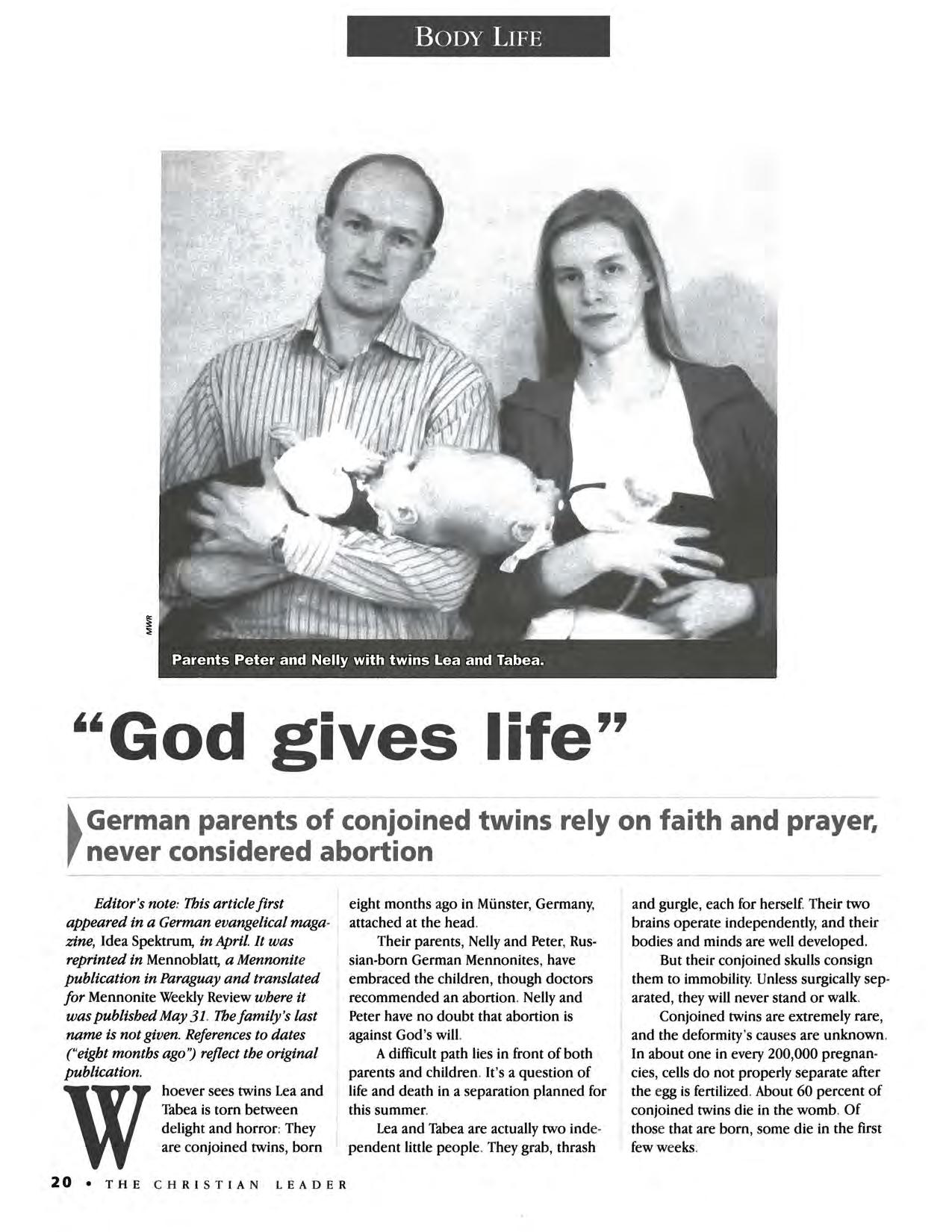
and gurgle, each for herself Their two brains operate independently, and th e ir bodies and minds are well developed . But their conjoined skulls consign them to immobility. Unless surgically separated , they will never stand or walk.
Conjoined twins are extremely rare , and the deformity 's cause s are unknown . In about one in every 200,000 pregnancies, cells do not properly separate after the e gg is fertilized About 60 percent of conjoined twins die in the womb Of those that are born, some die in the first few we eks .
Abortion was never an option for Nelly, 26 , and Peter, 27 When the malformation was discovered in Nelly ' s 10th week of pregnancy, they felt "as if the sky was falling in," Nelly says
But she and her husband immediately agre ed: "We do not have the right to decide over life and death God gives life. And if he gives it to us like this, then we have to try to accept it as it is "
Nelly says "For me, it would simply have been the murder of my children I could not have lived with that. "
Nelly worked for the majority of her pregnancy as a teacher in an evangelical parochial school in he r e astern Westphalian city. Her colleagues prayed for her often " They carried the burden as well but did not gossip about it," remembers the former principal.
Nelly is a happy, open Christian whose deep faith in her Creator held through this crisis
Did they ever pray at the school for a miracle, that God would separate the babies ' heads in the womb?
"No We don't believe that every suffering can be quickly prayed away, " says
the retired principal. "God has led many people to maturity and spiritual growth in their suffering "
Despite their separate brains, Le a and Tabea have an awkward type of intergrowth .
They share veins in the ir heads, which will be difficult to repair and replace Even if the first procedure is successful, the twins will face a long series of operations Their missing skull sections will have to be continuously reformed to accommodate their bodi e s' growth .
It gives the parents courage that they have found in an American professor of medicine, Benjamin Carson, not only one of the world ' s leaders in pediatric ne urosurgery but also a dedicated Christian . Carson will probably perform the surgery this summer in the U. S In what condition the twins will survive is impo ssible to predict.
Peter and Nelly are convinced , however, that success require s a power besides that of the doctors: prayer. In their family, their circle of friends and their active Mennonite congregation, the twins are the subject of much prayer
"We have always placed them under the protection of God , and the parents have also felt themselves supported in this way, " says a fri e nd .
Surgery is still about four months away. Nelly and Pet e r have to lift the twins together The little on e s tip the scales at 30 pounds and are 52 inches long.
Every day they become more dissatisfied at being shackled at the head A special V-shaped bed , a special bathtub , special clothing, a special stroller-everything has to be adapted for them
In preparation for the surgery, German doctors will dilate the girls ' scalps with silicone implants that can b e pumped up . In this way, they will gain t ransplant material for the day when they each will have their own enclosed skull .•
This article is reprinted by permission from MWR MWR translator Keri Waltner of Newton, Kan ., says, "This story is especially powerful because in Germany abortion is widely accepted and commonplace This couple's stance would be shocking to the majority of Germans and a stunning testimony to faith in a God who does not make mistakes "
Individual subscriptions to the Christian Leader will increase beginning August 2004 . The Board of Communications decided to increase the cost of individual subscriptions at its March 2004 board meeting.
The rate for an individual subscription will increase from $16 to $18 for one year, from
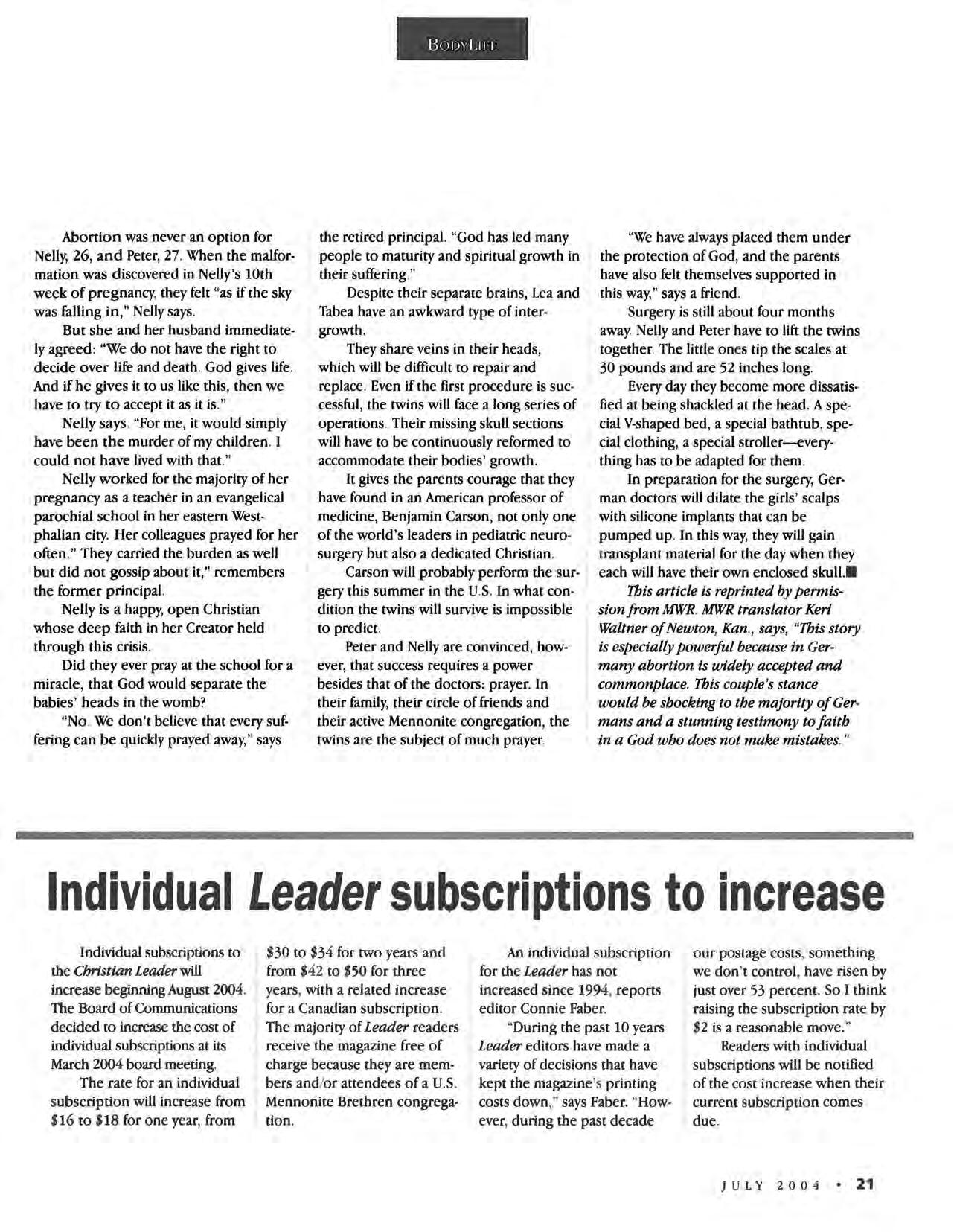
$30 to $34 for two years and from $42 to $50 for three years , with a related increase for a Canadian subscription The majority of Leader readers receive the magazine free of charge because they are members and /or attendees of a U.S . Mennonite Brethren congregation.
An individual subSCription for the Leader has not increased since 1994 , reports editor Connie Faber.
"During the past 10 years Leader editors have made a variety of decisions that have kept the magazine 's printing costs down ," says Faber. "However, during the past decade
our postage costs , something we don ' t control , have risen by just over 53 percent. So I think raising the subscription rate by $2 is a reasonable move. "
Readers with individual subSCriptions will be notified of the cost increase when their current subSCription comes due .

Ithough Loyal Funk is stepping down after 16 years as director of Integrated Ministries, he is not retiring from ministry. He says emphatically, "I don't think I want to retire until my toes continue to point upward." Indeed, his commitment to and concern for the churches of immigrant peoples remain strong, no matter what his job title Funk's focus on ministry began early in life. "Strange as it may sound," he says, "by the time I was eight, I knew the Lord had called me to ministry."
When the Board of Evangelism approached him in 1988 to work with immigrant churches, he says he was attracted to the position because, "I knew that the Lord wanted to reach every people
group." His assignment was "to come to the aid of immigrants that needed help in church planting, church formation and in the planting of new churches with the various ethnic groups," he says .
The 1M mission, originally called Mission USA, came about as a result of challenges by both the General Conference and the U.S. Conference to plant churches among various ethnic people groups. Special governmental provisions for immigrants from communist countries drew thousands of Slavic immigrants into the U.S and opened the first doors for 1M ministry.
Funk says that to begin ministry to these Slavic immigrants, "I simply went and nosed around and found them." MB history in the Ukraine provided common ground and some already had a familiarity with MBs. Later, the work expanded to include immigrants from Korea, Ethiopia and other countries. Funk became an advocate for these immigrant churches, helping with everything from building loans to church polity issues to finding a way through local bureaucracy. Jon Wiebe, president of the MB Foundation, says Funk has been "steadfast and untiring in his efforts to fulfill the mandate given to him " Language was rarely a difficulty, even in the early days, says Funk, because younger generations usually spoke English, so translators were readily available . But that doesn't mean the work was easy ')\Jways bridging cultural and sociological trends has difficulty," Funk says. He says that personal relationships have been key.
In order to build trust, Funk says, "You move amongst them as a servant." He points out that Anabaptist belief in the priesthood of every believer is attractive to people groups that have a distrust of education or titles . Funk says that, while the immigrant churches have always known he was a leader, "I walk alongside and try to
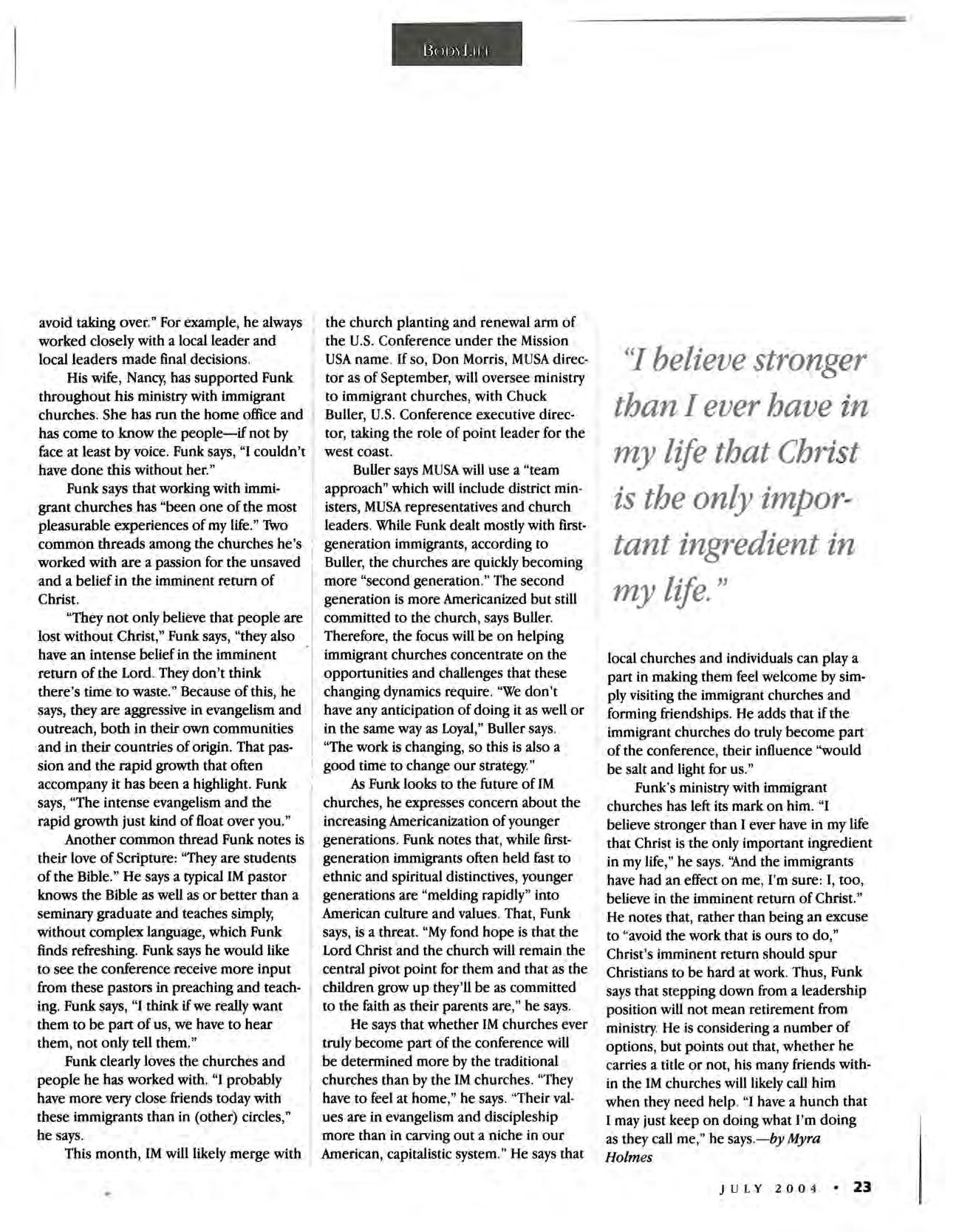
avoid taking over." For example, he always worked closely with a local leader and local leaders made final decisions
His wife, Nancy, has supported Funk throughout his ministry with immigrant churches. She has run the home office and has come to know the people-if not by face at least by voice. Funk says, "I couldn't have done this without her."
Funk says that working with immigrant churches has "been one of the most pleasurable experiences of my life." Two common threads among the churches he's worked with are a passion for the unsaved and a belief in the imminent return of Christ.
"They not only believe that people are lost without Christ," Funk says, "they also have an intense belief in the imminent return of the Lord They don't think there's time to waste." Because of this, he says, they are aggressive in evangelism and outreach, both in their own communities and in their countries of origin. That passion and the rapid growth that often accompany it has been a highlight. Funk says, "The intense evangelism and the rapid growth just kind of float over you. "
Another common thread Funk notes is their love of Scripture: "They are students ofthe Bible." He says a typical 1M pastor knows the Bible as well as or better than a seminary graduate and teaches simply, without complex language, which Funk finds refreshing. Funk says he would like to see the conference receive more input from these pastors in preaching and teaching. Funk says, "I think if we really want them to be part of us, we have to hear them, not only tell them."
Funk clearly loves the churches and people he has worked with. "I probably have more very close friends today with these immigrants than in (other) circles," he says . This month, 1M will likely merge with
the church planting and renewal arm of the U.S. Conference under the Mission USA name If so, Don Morris, MUSA director as of September, will oversee ministry to immigrant churches, with Chuck Buller, U.S. Conference executive director, taking the role of point leader for the west coast.
Buller says MUSA will use a "team approach" which will include district ministers, MUSA representatives and church leaders While Funk dealt mostly with firstgeneration immigrants, according to Buller, the churches are qUickly becoming more "second generation ." The second generation is more Americanized but still committed to the church, says Buller Therefore, the focus will be on helping immigrant churches concentrate on the opportunities and challenges that these changing dynamics require. "We don't have any anticipation of doing it as well or in the same way as Loyal," Buller says. "The work is changing, so this is also a good time to change our strategy: "
As Funk looks to the future of 1M churches, he expresses concern about the increasing Americanization of younger generations. Funk notes that, while frrstgeneration immigrants often held fast to ethnic and spiritual distinctives, younger generations are "melding rapidly" into American culture and values . That, Funk says, is a threat. "My fond hope is that the Lord Christ and the church will remain the central pivot point for them and that as the children grow up they'll be as committed to the faith as their parents are," he says.
He says that whether 1M churches ever truly become part of the conference will be determined more by the traditional churches than by the 1M churches. "They have to feel at home," he says. "Their values are in evangelism and discipleship more than in carving out a niche in our American, capitalistic system." He says that
'1 believe stronger than I ever have in my life that Christ is the only important ingredient in my life."
local churches and individuals can playa part in making them feel welcome by simply visiting the immigrant churches and forming friendships. He adds that if the immigrant churches do truly become part of the conference, their influence "would be salt and light for us."
Funk's ministry with immigrant churches has left its mark on him. "I believe stronger than I ever have in my life that Christ is the only important ingredient in my life," he says. '}\nd the immigrants have had an effect on me , I'm sure: I, too, believe in the imminent return of Christ." He notes that, rather than being an excuse to "avoid the work that is ours to do," Christ's imminent return should spur Christians to be hard at work. Thus, Funk says that stepping down from a leadership position will not mean retirement from ministry He is considering a number of options, but points out that, whether he carries a title or not, his many friends within the 1M churches will likely call him when they need help "I have a hunch that I may just keep on doing what I'm doing as they call me," he says .-by Myra Holm es
who worked with Disciple Making International teams, now under the direction of James Nikkel.
The Balkovye (Ruckenau) Church was begun under the direction of Frank Dyck, a teacher and church planter from Calgary The Kutuzovka Church was started by Gerhardt Schroeder, a former missionary and teacher in Nigeria . May 26 the split of 1860 took a step toward reconciliation. Thanks to the formation of this new conference, with its three supporting agencies from three different countries, and the adoption of the ICOMB confession of faith , there is now a common umbrella under which all Mennonites can plant churches in the Ukraine
"we, the Evangelical Mennonite Churches in Zaporozhye, Kutuzovka, Kherson and Balkovye, Ukraine, joyfully announce the establishment of the 'Christian Union of Mennonite Churches '" This statement heads the document of the first organized conference of Ukrainian Anabaptist believers in about 70 years
Three partnering agencies, MBMS International, the Mennonite Church Canada- Witness and Logos International, based in Germany, have been working for many years to see their church planting efforts come to this stage of fulfillment. Delegates from these three agencies and four local churches signed the foundational agreement May 26 in Chortiza, Ukraine . "This brings to fruition a dream that both Victor Adrian, my predecessor, and I have prayed for and worked toward over
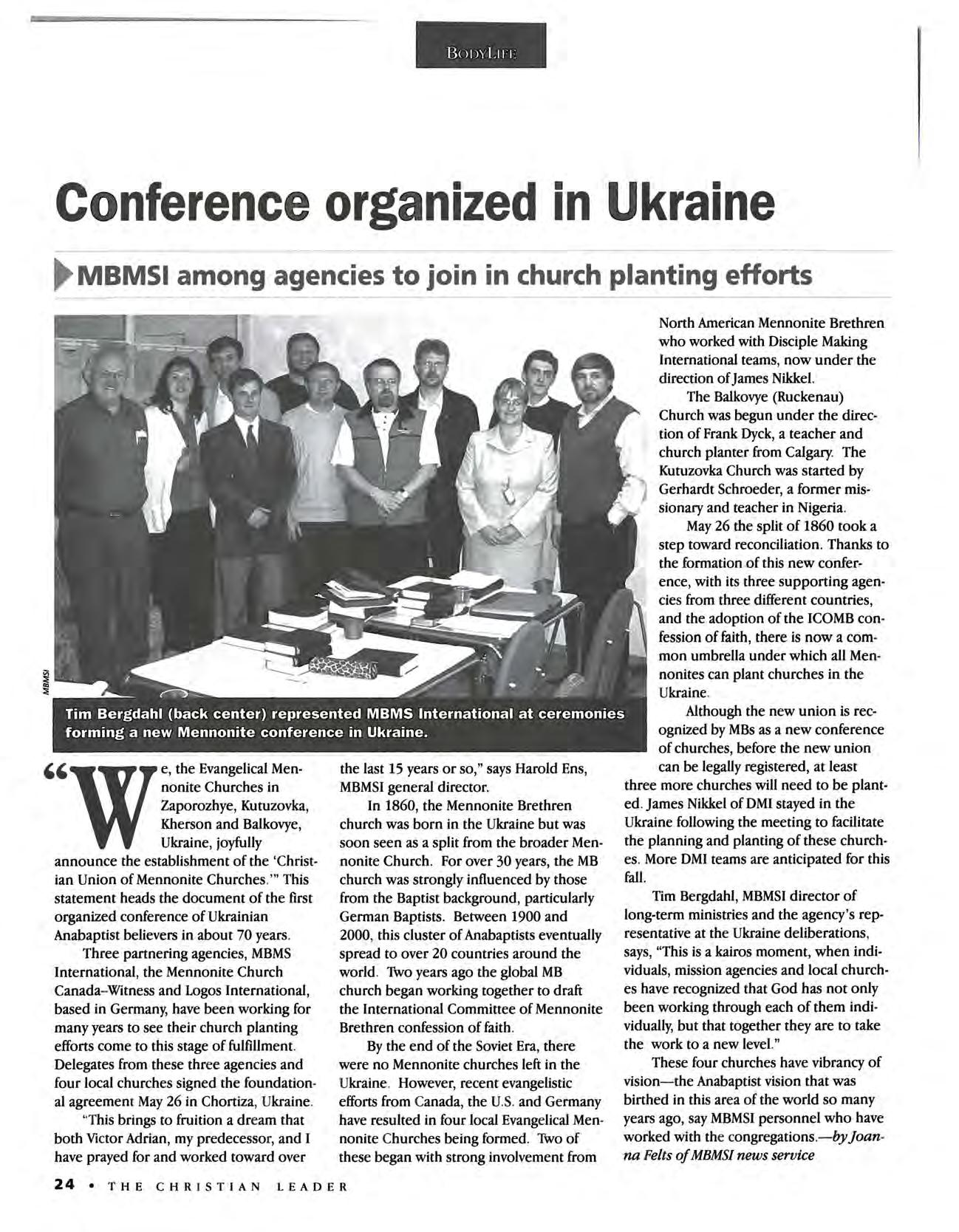
the last 15 years or so," says Harold Ens, MBMSI general director.
In 1860, the Mennonite Brethren church was born in the Ukraine but was soon seen as a split from the broader Mennonite Church For over 30 years, the MB church was strongly influenced by those from the Baptist background, particularly German Baptists. Between 1900 and 2000 , this cluster of Anabaptists eventually spread to over 20 countries around the world . 1\vo years ago the global MB church began working together to draft the International Committee of Mennonite Brethren confession of faith
By the end of the Soviet Era, there were no Mennonite churches left in the Ukraine However, recent evangelistic efforts from Canada, the u.s and Ge rmany have resulted in four local Evangelical Mennonite Churches being formed. Two of these began with strong involvement from
Although the new union is recognized by MBs as a new conference of churches, before the new union can be legally registered, at least three more churches will need to be planted James Nikkel of DMI stayed in the Ukraine following the meeting to facilitate the planning and planting of these churches More DMI teams are anticipated for this fall.
Tim Bergdahl, MBMSI director of long-term ministries and the agency's representative at the Ukraine deliberations , says, "This is a kairos moment, when individuals, mission agencies and local churches have recognized that God has not only been working through each of them indiVidually, but that together they are to take the work to a new level."
These four churches have vibrancy of vision- the Anabaptist vision that was birthed in this area of the world so many years ago, say MBMSI personnel who have worked with the congregations.-by joanna Felts ofMBMSI news service
EIGHTEEN YOUNG PEOPLE FROM CANADA AND THE u.s. spent five days in Manning Park, B C., April 23 -27 fo r the spring Ministry Quest retreat . Ministry Quest is a program that helps high school students explore God's call on their lives It features retre ats, church -based internships and short-te rm ministry aSSignments
Ken Cross of Laurelglen Bible Church in Bakersfield , Calif., led the group in exploring Scriptures about spiritual gifts and provided one -on -one counsel for each youth on their future career plans . Doug Berg led the group in theological refle ction on biblical leadership . Each day began with an extended quiet time focusing on Psalm 139.
The purpose of the retreat is to proVide an opportunity for all current Ministry Quest participants to me e t together for worship, friendship building and enrichment. "I am most grateful for the spiritual growth and deep connection with God and the other kids here," says one participant in reflecting on the experience "God is making His calling continually clearer for me "
This summer each of the participants will be spending some time in a short-term ministry assignment. At least 10 of the youth will be serving at a summer camp, four will be serving in missions abroad and several others are participating in the YMI SOAR program
Ministry Quest is part of the "Hearing the Call" initiative of MB Biblical Seminary and is funded by the Lily Endowment, Inc -MBBS news release
According to the Ca li fornia Department of Insurance Homeowners Survey, the cost of homeowners insurance offered by Mennonite Insurance Services is a,t least 50% Less than the equivalent offered by four other leading companies serving central California. The reason Is simple. Mennonite Insurance Services is the exc lusive agent for the Mennonite Aid Plan of the Pacific Coast. No frills, smaller bills.
So ... if you 're already a member of, or regularly attend a Mennonite, Brethren in Christ or a Mennonite Brethren Church, call us today for a FREE no-obligatlon quote on your homeowners insurance and a copy of the referenced survey. Being together makes the difference.
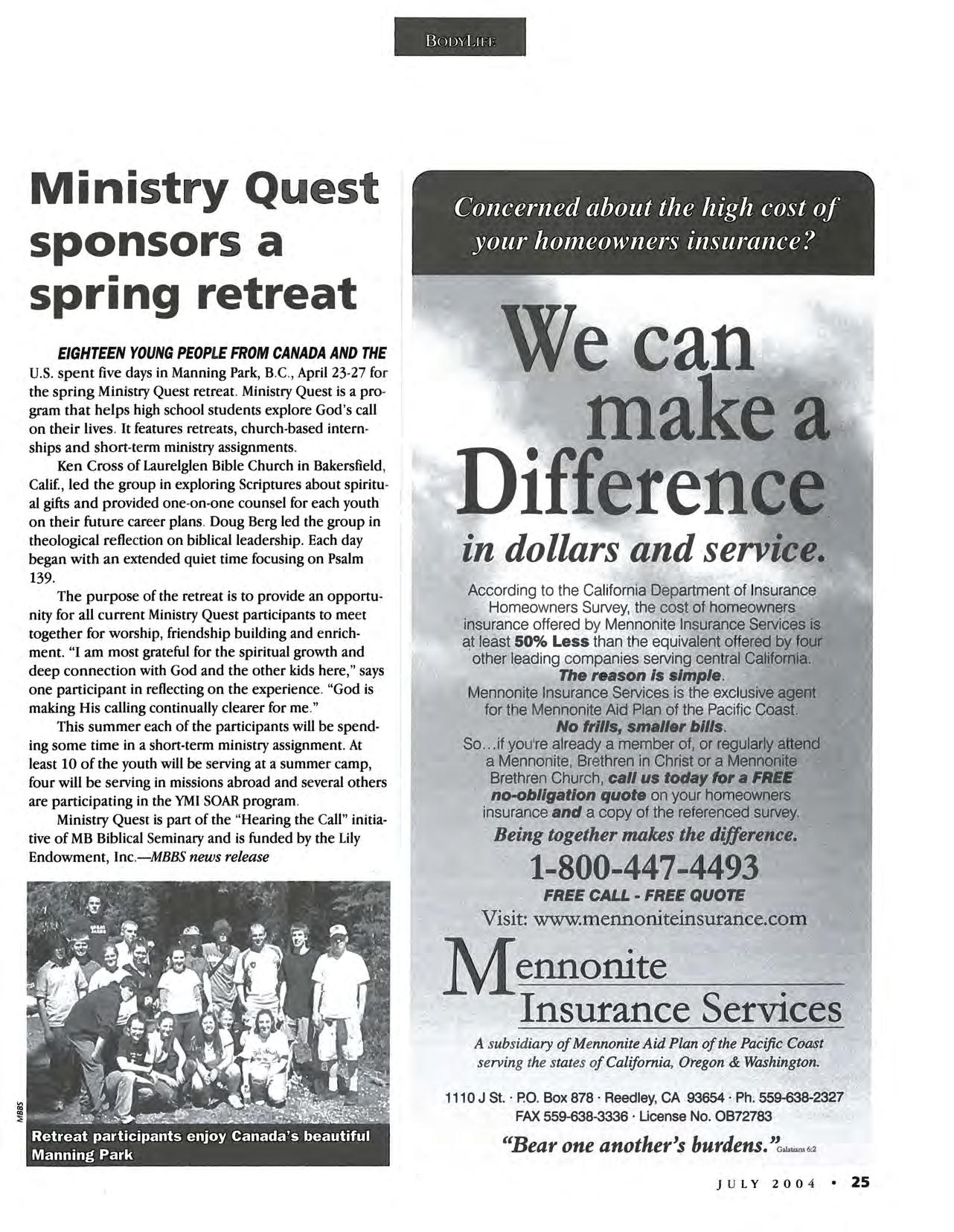
"Bear
The government of Sudan and the country's major rebel group, the Sudanese People's Liberation Army!Movement, signed a historic peace agreement May 26, raising hopes that the country's decadesold civil war is finally drawing to a close.
Mennonite Central Committee Sudan workers joined the crowd waiting for the signing ceremony in Naivasha, Kenya. They also attended a celebratory ecumenical worship service convened the next day by the All Mrica Conference of Churches.
"We sense that Sudanese are enormously relieved, but also apprehensive about the implementation of the agreement ," says Harold Miller, MCC Sudan corepresentative
The war has pitted rebels from the south, which is predominantly black and Christian and animist, against government
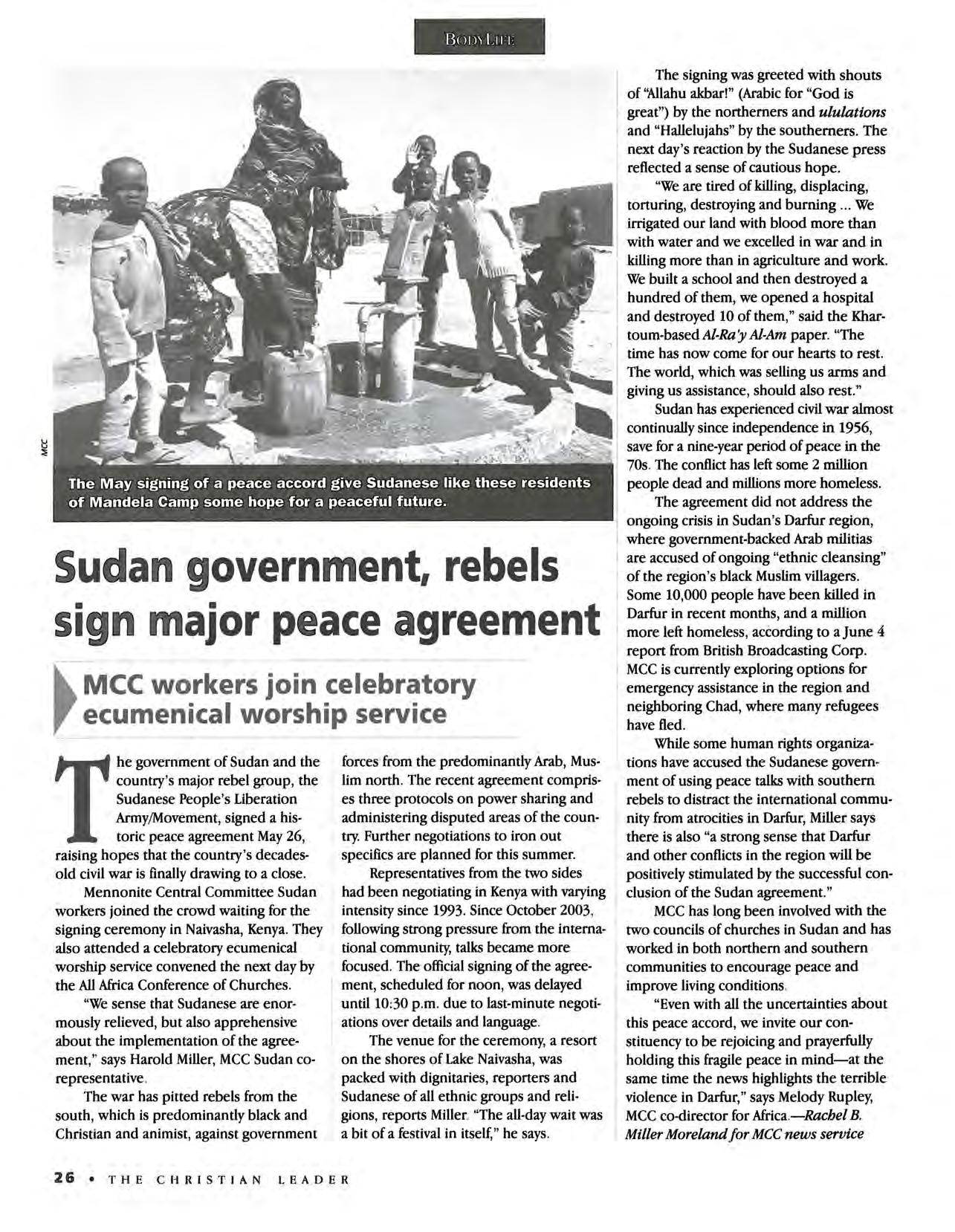
forces from the predominantly Arab, Muslim north The recent agreement comprises three protocols on power sharing and administering disputed areas of the country. Further negotiations to iron out specifics are planned for this summer.
Representatives from the two sides had been negotiating in Kenya with varying intensity since 1993 . Since October 2003 , following strong pressure from the international community, talks became more focused. The official signing of the agreement, scheduled for noon, was delayed until 10 :30 p m. due to last-minute negotiations over details and language .
The venue for the ceremony, a resort on the shores ofLake Naivasha, was packed with dignitaries, reporters and Sudanese of all ethnic groups and religions, reports Miller "The all -day wait was a bit of a festival in itself," he says .
The signing was greeted with shouts of akbar!" (Arabic for "God is great") by the northerners and ululations and "Hallelujahs" by the southerners. The next day's reaction by the Sudanese press reflected a sense of cautious hope
"We are tired of killing, displacing, torturing, destroying and burning We irrigated our land with blood more than with water and we excelled in war and in killing more than in agriculture and work. We built a school and then destroyed a I hundred of them, we opened a hospital and destroyed 10 of them," said the Khartoum-based Al-Ra y AI-Am paper "The
time has now come for our hearts to rest.
The world, which was selling us arms and giving us assistance, should also rest."
Sudan has experienced civil war almost continually since independence in 1956, save for a nine-year period of peace in the 70s The conflict has left some 2 million people dead and millions more homeless.
The agreement did not address the ongoing crisis in Sudan's Darfur region, where government-backed Arab militias are accused of ongoing "ethnic cleansing" of the region's black Muslim villagers. Some 10,000 people have been killed in Darfur in recent months, and a million more left homeless, according to a June 4 report from British Broadcasting Corp . MCC is currently exploring options for emergency assistance in the region and neighboring Chad, where many refugees have fled.
While some human rights organizations have accused the Sudanese government of using peace talks with southern rebels to distract the international community from atrocities in Darfur, Miller says there is also "a strong sense that Darfur and other conflicts in the region will be positively stimulated by the successful conclusion of the Sudan agreement."
MCC has long been involved with the two councils of churches in Sudan and has worked in both northern and southern communities to encourage peace and improve living conditions
"Even with all the uncertainties about this peace accord, we invite our constituency to be rejoicing and prayerfully holding this fragile peace in mind-at the same time the news highlights the terrible violence in Darfur," says Melody Rupley, MCC co -director for Mrica -Rachel B. Miller Moreland for Mee news service
When Mennonite Central Committee approached North Kildonan MB Church of Winnipeg, Man , with a request to help three Sudanese refugees, Henry Bergen's care group was quick to step fOIWafd.
"There were people among us who could relate to their experience," says Bergen, whose family immigrated to Canada in 1947 from the upheaval of postwar Eastern Europe. "There were people in Canada willing to help us, and now we wanted to give something back."
The young Sudanese males, ages 13, 15 and 20, had fled their war-town homeland, mired in decades of civil war The conflict has centered on religious differences, demands by the Sudan People's Uberation Army for a greater role in government and access to revenues from the country's oilrich land
"Here in Canada, we can sit and watch the troubling events taking place in other parts of the world," says Bergen. "Few people fully understand the fear and uncertainty that these young men would have experienced "
The young men wived at Winnipeg International Airport with little more than the clothes on their backs and each other From a refugee camp in neighboring Ethiopia, they had been granted refugee status by the Canadian government. A federal sponsorship program would look after their financial needs for the next two years Meanwhile, Bergen's church care group would provide social support
Bergen describes his own refugee experience as similar to that of many other Mennonites. He wived in Canada as a 16-yearold boy with his mother and Siblings They
In a world plagued by pain and suffering, injustice and war, how do we know we are doing what God asks of us?
We will know if we stop and listen to the voice of God heard through those crying out for peace, justice and hope.
In 2003104 Mennonite Central Committee listened, responding with 1,400 workers in 55 countries , supported by $96 million C dn./$69 million U.S. in funds and material aid
MATTHEW 25:35-36
I was hungry and you gave me food, I was thirsty and you gave me something to drink, I was a stranger and you welcomed me, I was naked and you gave me clothing, I was sick and you took care of me, I was in prison and you visited me. For a copy of the MCC 2003104 Annual Report contact your nearest MCC office or go to at www mcc orglannualreport.
Canada (888) 622 -633 7 u.s. (888) -563 -4676
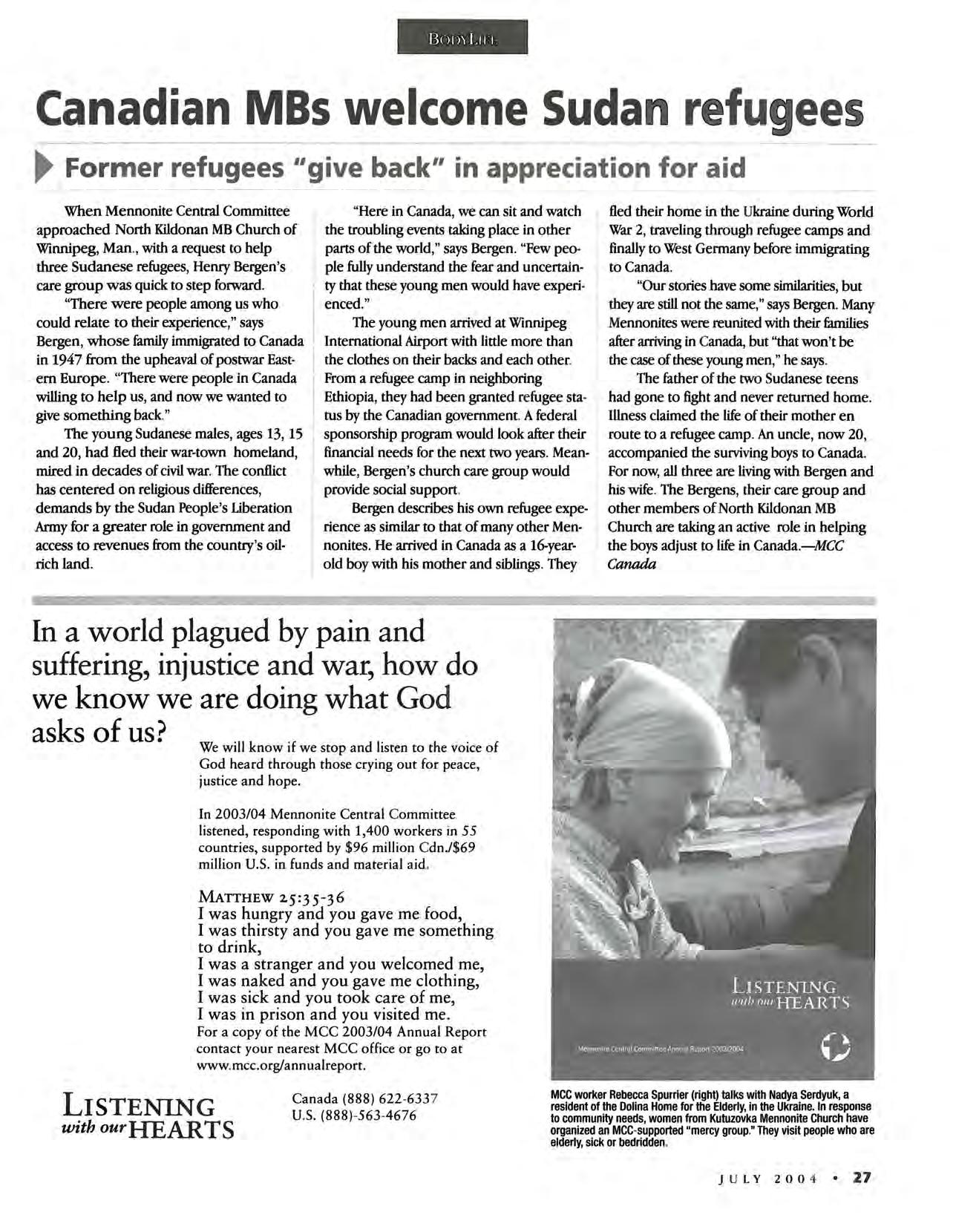
fled their home in the Ukraine during World War 2, traveling through refugee camps and finally to West Germany before immigrating to Canada
"Our stories have some similarities, but they are still not the same," says Bergen. Many Mennonites were reunited with their fumilies after arriving in Canada, but "that won't be the case of these young men," he says
The father of the two Sudanese teens had gone to fight and never returned home Illness claimed the life of their mother en route to a refugee camp An uncle, now 20, accompanied the surviving boys to Canada For now, all three are living with Bergen and his wife The Bergens, their care group and other members of North Kildonan MB Church are taking an active role in helping the boys adjust to life in Canada.-MCC Canada
This month, u.s Mennonite
Brethren will gather in Salt Lake City to take action on a recommendations, to discuss issues relevant to the church today and to enjoy the fellowship of other believers The five-day convention, hosted July 21-26 by South Mountain Community Church of Draper, Utah, is comprised of three events: the first-ever Pastors' Convention followed by the U.S. Conference biennial convention . A 55-Plus Convention concludes the weekend Recommendations and ministry reports were published in the June issue of the Leader and will be distributed to delegates on-site
Convention organizers have recently announced several developments . Online registration
Convention goers can now register online, says Donna Sullivan, convention registrar, using the ''july 2004 Convention" link at www.usmb .org.
Pastors' events
Several special events have been added
for youth pastors attending the Pastors' Convention A social event will be held after the Wednesday evening session, an afternoon event is scheduled for Thursday and a youth ministry forum for Friday morning. Pastors can also participate in a Thursday afternoon golf tournament. Tourney participants are asked to make their reservations with Paul Robie at admin@southmountainchurch.org
The ticket for the Thursday evening concert with Bebo Norman is included in the cost of the Pastors' Convention. Tickets will be sold to the public. Norman is a Dovenominated and critically acclaimed singer/songwriter He recently completed production on his fourth studio album, "Try, " to be released in August. Children and youth activities
Phil Wiebe, South Mountain youth pastor, is coordinating activities for children ages two through 18. Both children and young people will need to bring swimming clothing and clothes that they can be outside in and can get dirty, says Wiebe The
NOrth American Mennonite
Brethren have-at least unofficially-declared July as convention month 1Wo weeks before u.S MBs gather in Salt Lake City, Canadian MBs will be meeting in Toronto July 7-10 for their biennial national convention Both delegations will affirm Jim Holm as the president of MB Biblical Seminary and Randy Friesen as the MBMS International general director and will process recommendations from MBMS International regarding funding and vision
Coincidentally, Canadian and u S. delegates will also consider recommendations from th e ir respective national leadership board regarding governance . The governance model recommended by the Canadian Conference Executive Board is
similar to the proposed u. S model in that it includes on executive board charged with setting vision and direction Both models are staff oriented. The Canadian proposal differs from the U S model in that it also includes a Board of Faith and Life to provide for the "spiritual watch care on behalf of (the) membership," according to Canadian Conference moderator Jascha Boge An Executive Board plus ministry boards currently governs the Canadian Conference.
In other business , the Canadian BFL is asking delegates to affirm a statement regarding baptism and church membership and to approve a pastoral covenant , a statement on divorce and lead e rship ministry and a statement on spiritual warfare The Board of Evangelism is recommend -
youth may want to bring work gloves
Activities planned for children (ages 212) include a visit to Salt Lake 's planetarium and a copper mine so large it can be seen from space. They will swim at a local pool and enjoy games in a local park. The children will also be led through a mini-VBS led by the South Mountain youth Mexico mission team VBS activities will include dramas, Singing, crafts , and perhaps some new ways that the children will be able to remember some "pretty cool" Bible verses , says Wiebe . The youth (ages 13-18) will experience a little bit of what South Mountain young people do, says Wiebe Plans call for evening Bible studies , times of worship, a trip to Seven Peaks water park, as well as a service day where the convention guests will be joining the South Mountain RAS.K. (Random Acts of Senseless Kindness) Force Team The team helps needy people in the community, and will be working in a local downtown shelter.
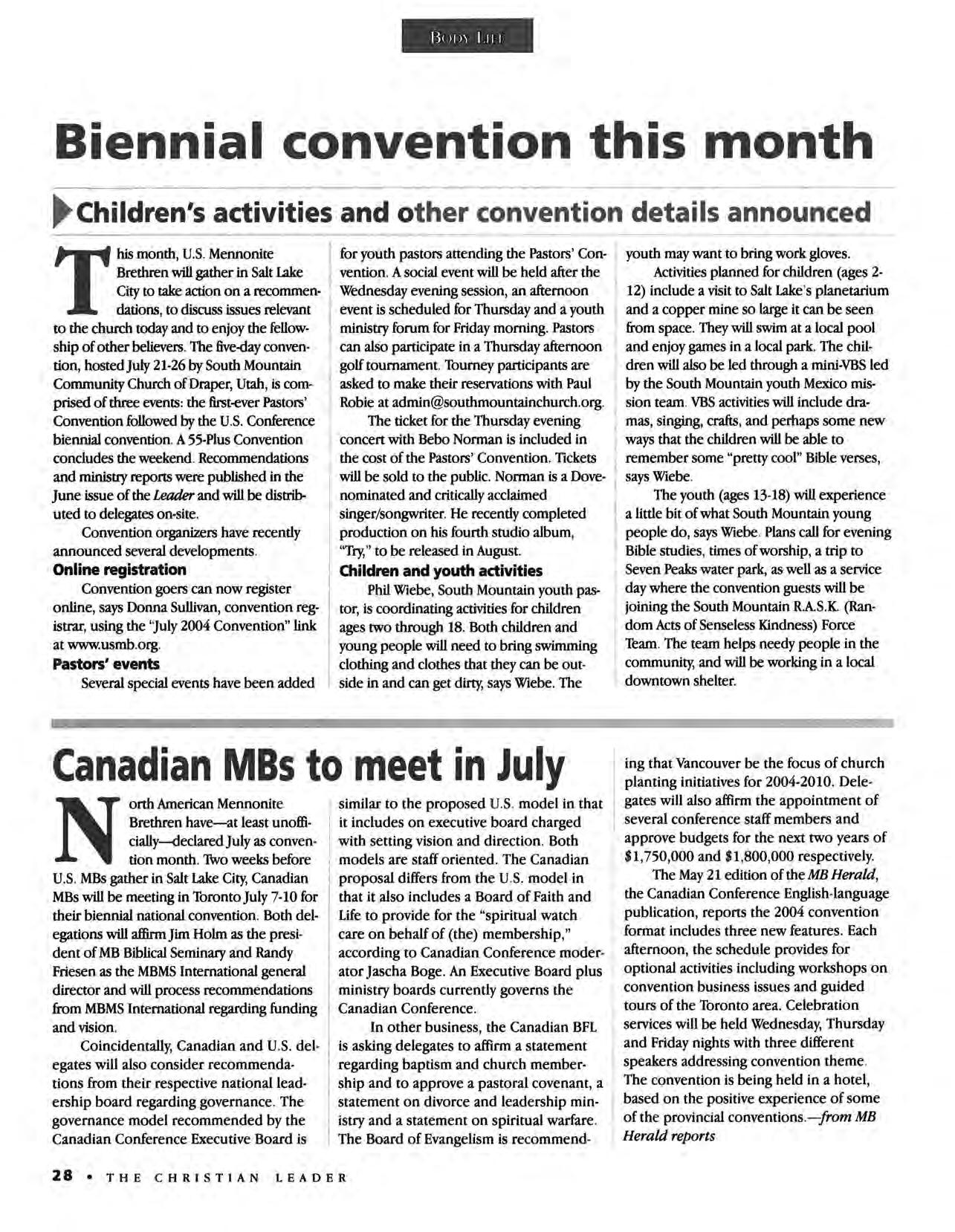
ing that Vancouver be the focus of church planting initiatives for 2004 -2010 Delegates will also affirm the appointment of several conference staff members and approve budgets for the next two years of $1,750,000 and $1 ,800,000 respectively
The May 21 edition of the MB Herald, the Canadian Conference English -language publication, reports the 2004 convention format includes three new features. Each afternoon, the schedule provides for optional activities including workshops on convention business issues and guided tours of the Toronto area Celebration services will be held Wednesday, Thursday and Friday nights with three different speakers addressing convention theme
The convention is being held in a hotel, based on the positive experience of some of th e provincial conventions - from MB Herald reports

Plans to start a Southern District Conference U-SERV program got a jump start this spring when coordinator Wilmer Thiessen of Hillsboro, Kan , received a call inviting the fledging ministry to assist the Ethiopian Christian Fellowship Church in Olathe, Kan . Since Thiessen had not completed the preparation he had envisioned beginning the volunteer ministry, he declined the invitation . But less than 24 hours later, Thiessen was led to change his mind and the dream of beginning a SOC chapter of the U S Conference ministry became a reality.
U-SERY, an acronym for Utilizing Skills and Energies of Ready Volunteers, is a grassroots program of the U.S. Conference funded by its volunteers . Conference leaders Loyal Funk and Lynford Becker launched U-SERV in 1998 when many Mennonite Brethren church plants sprouted and ethnic and immigrant groups sought help U- SERV works in partne rship with MB churches and related ministries by providing labor and some material resources
Since 1998 the program has matched some 2,000 volunteers with more than 60
projects. Until his death earlier this year, Ted Thiesen , a PDC volunteer from Bakersfield, Calif. , coordinated the program at his own cost from home The SOC is the first conference to organize a USERV program at the regional level.
Eight volunteers made up the first SOC work team and spent May 20-21 in Olathe The Ethiopian congregation, one of the newest congregations in the SOC, is nearing completion of a worship facility They requested help from U-SERV to lay some tile flooring so construction would stay on schedule . Not only did the U-SERV team help keep the proj ec t on schedule, but Robert Dick, a volunteer from the Topeka (Kan .) MB Church that has been working with the Ethiopi a n congregation, e stimates th e U- SERV team save d the congregation abo u t $1 ,500 .
The U-SERV team was comprised of Robert and Carolee Derksen of First MB Church in Wichita, Kan , Kevin Brandt of Hillsboro (Kan ) MB Church , Danny Funk and Chris Letts , of Community Bible Church in Olathe and Robert Brandt and Thiessen and his wife Hildegard of Parkvi e w MB Church . In addition to Thiessen, the SOC e xecutive committee has appointed Arlyss Funk of Denver, Colo , Ervin Reimer of Hays, Kan , Danny Funk of Olathe and Wayman Penner of Thlsa, Okla , to the USERV leadership team . The SOC effort will be known as Team U-SERY, says Thiessen . Thiessen is hoping to recruit a variety of members to the Team U-SERV program "Team U-SERV is organized to honor our Lord Jesus Christ by utilizing the gifts and talents he has given us, " says Thiessen . Interested volunteers can contact Thiessen at 620 -947-3632 - from a Team U-SERV report
Arthur Flaming, who as the flfst Southern District Conference minister was the first to serve in that role among U.S Mennonite Brethren, has often been described as a tireless worker with a love for people and the Mennonite Brethren church Flaming, of Hillsboro, Kan., died May 17,2004, at the age of 87
Flaming demonstrated his commitment to the MB church as he moved to and ministered in a variety of places throughout the U.S. He and his wife Linda served MB churches in Lustre, Mont., Henderson, Neb., Bakersfield, Calif., and Dallas, Ore., and as pastor to seniors at Hillsboro (Kan.) MB Church
In 1964, the Southern District called Flaming to begin what at that time was an innovative ministry to churches and pastors in the district. As OM, Flaming served 46 churches over a period of 19 years The success of Flaming's work eventually prompted other regions to hire district ministers. In fact, for one year in the mid 70s Flaming served both the Central and Southern districts as OM.
Roland Reimer, who served as Flaming's successor in the SOC, says, "In many ways, Art made the term 'district minister' a household word as he circulated through the district I view his role as that of a pioneer in conference ministry and he covered the territory as a modern 'circuit rider.'"
Reimer continues, carved out a focus for ministry that was pastor-centered and popularized the term 'pastor to the pastors' and served as the designated hitter for conference boards and business. Art and Linda became a valued team as they worked together in the district office CDC."
Pastors who served SOC churches during Flaming 's time as district minister remember Flaming as one who saw the best in people . Nick Rempel, long time pastor at Buhler ( Kan ) MB church, says, "He was a very congenial person who was
eager to affirm everyone, even when they screwed up "
Dennis Fast, pastor of Reedley (Calif.) MB Church says, always believed the best about people. As a result, he encouraged a lot of young men into the ministry through visits, shoulder tapping and generally blessing those in whom he saw gifts for ministry." Fast served the Hillsboro MB Church while Flaming was the SOC minister and was also on the pastoral staff with Flaming when Flaming served the Hillsboro congregation
Blessing people was an integral part of Flaming's character and ministry He was quick to sayan encouraging word to those he met. Rempel says, "In all my contacts with Art he never made me feel inferior. Even though he was older, we were friends. I didn't have the feel of being with someone that was a supervisor or district minister "
Flaming was known as often being one of, if not the first, to arrive at any church gathering and committee meeting and for being early to appointments with pastors . "It was hard to beat him to an appointment, hospital visit or ministry assignment. " says Fast
While offering spiritual nourishment to those he served, he also enjoyed eating together which was often part of his travel and contacts with pastors and congregations . Rempel, who often traveled with Flaming, says, "He was a tireless traveler
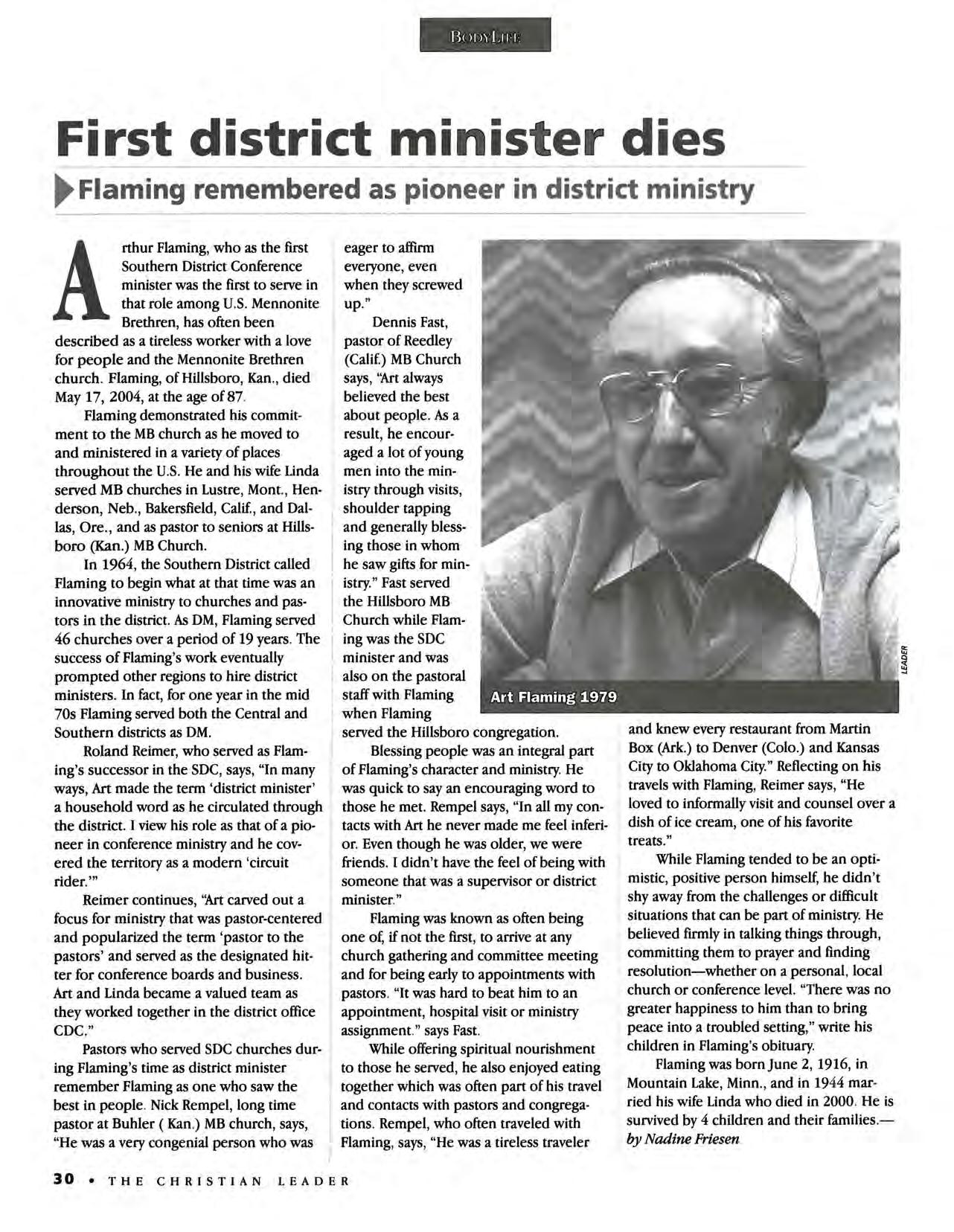
and knew every restaurant from Martin Box (Ark.) to Denver (Colo.) and Kansas City to Oklahoma City." Reflecting on his travels with Flaming, Reimer says, "He loved to informally visit and counsel over a dish of ice cream, one of his favorite treats."
While Flaming tended to be an optimistic, positive person himself, he didn't shy away from the challenges or difficult situations that can be part of ministry. He believed frrmly in talking things through, committing them to prayer and finding resolution-whether on a personal , local church or conference level. "There was no greater happiness to him than to bring peace into a troubled setting," write his children in Flaming's obituary.
Flaming was born June 2, 1916, in Mountain Lake, Minn., and in 194 4 married his wife Linda who died in 2000 . He is survived by 4 children and their families .by Nadine Friesen
NINETEEN YOUTH PASTORS FROM across the u.s. and Canada gathered for a three-day consultation in May on the development of youth leadership MB Biblical Seminary and the Ministry Quest staff hosted and facilitated the event.
The consultation involved one day of spiritual formation learning and experience , a one-day slice of a Ministry Quest retreat and one day of consultation around the theme of youth leadership de velopment. This consultation
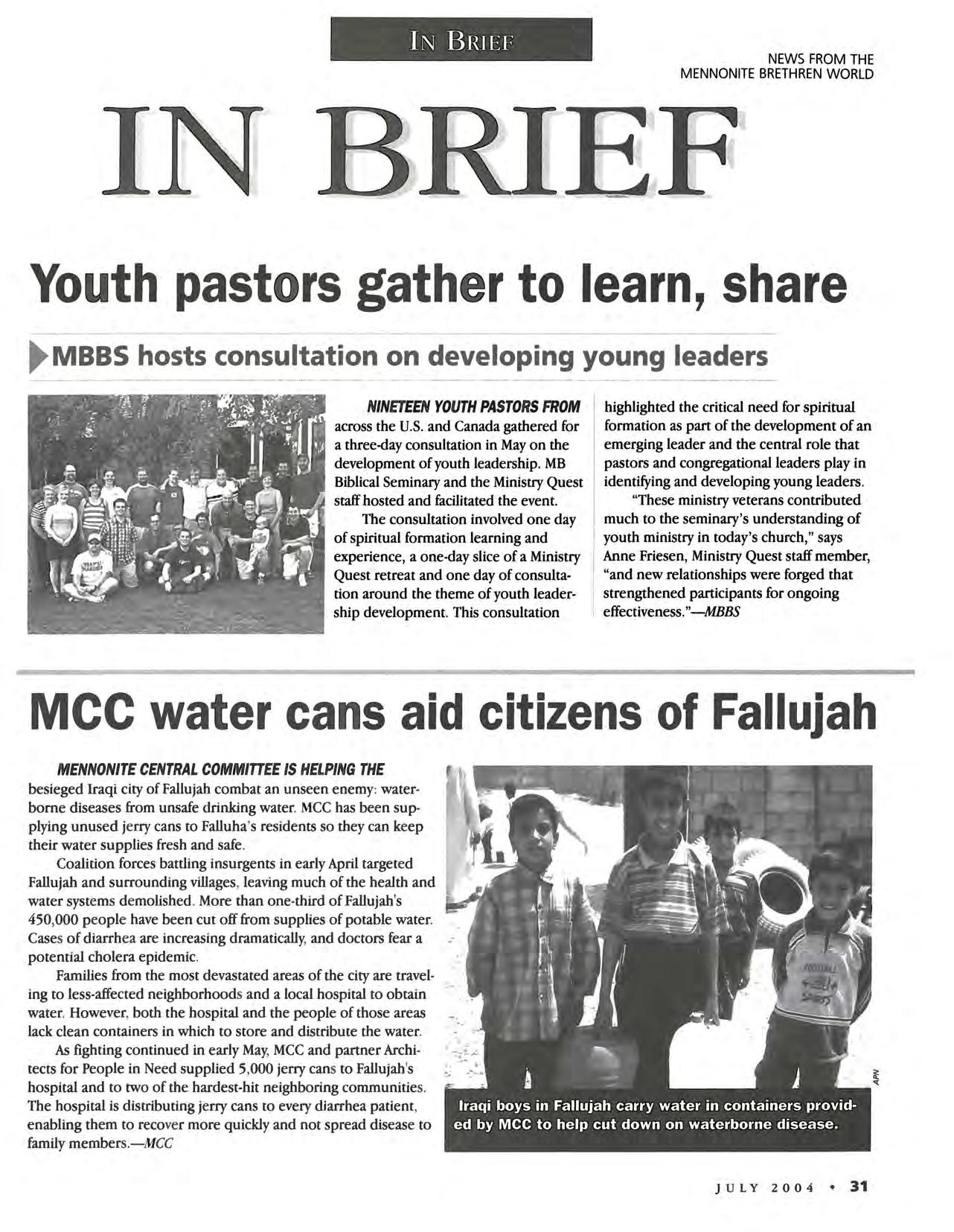
highlighted the critical need for spiritual formation as part of the development of an emerging leader and the central role that pastors and congregational leaders play in identifying and developing young leaders
"These ministry veterans contributed much to the seminary ' s understanding of youth ministry in today's church," says Anne Friesen, Ministry Quest staff member, "and new relationships were forged that strengthened participants for ongoing effectiveness. "-MBBS
MENNONITE CENTRAL COMMITTEE IS HELPING THE besieged Iraqi city of Fallujah combat an unseen enemy: waterborne diseases from unsafe drinking water MCC has been supplying unused jerry cans to Falluha 's residents so they can keep their water supplies fresh and safe .
Coalition forces battling insurgents in early April targeted Fallujah and surrounding villages , leaving much of the health and water systems demolished More than one -third of Fallujah 's 450 ,000 people have been cut off from supplies of potable water. Cases of diarrhea are increasing dramatically, and doctors fear a potential cholera epidemic
Families from the most devastated areas of the city are traveling to less-affected neighborhood s and a local hospital to obtain water However, both the hospital and the people of those areas lack clean containers in which to store and distribute the water
As fighting continued in early May, MCC and partner Architects for People in Need supplied 5 ,000 jerry cans to Fallujah 's hospital and to two of the hardest-hit neighboring communities. The hospital is distributing jerry cans to every diarrhea patient , enabling them to recover more qUickly and not spread disease to family members .-MCC
II,; - -
Rene Mejia, currently a student at Associated Mennonite Biblical Seminary in Elkhart, Ind., has been named the new director of Mennonite Central Committee Central States. Originally from EI Salvador, Mejia, his wife Conn ie and their three children fled to Canada during the civil war of the 1980s. They settled in Medicine Hat, Alta, where they first encountered Mennonites and were drawn to Anabaptist teachings. Mejia most recently served as pastor of Primera Iglesia Menonita Church in Defiance, Ohio and is currently working toward a master's degree in peace studies Mejia and his family have moved to North Newton, Kan., where the MCC Central States office Is located. His term began July 1 -MCC
Frank Brenneman, Tabor College professor of mathematical sciences, is the 2003 reCipient of the Clarence R Hiebert Excellence in Teaching Award The award is given annually to a member of the Tabor faculty who best exemplifies the qualities of excellent teaching. Those qualities include a strong Christian commitment, a record of excellence in teachIng at least three years at Tabor, evidence of Integrating faith and learning and contrlbution to the overall academic climate. Brenneman has taught and served as the chair of the Mathematical Sciences Department at Tabor since 1980.- TC
NEARLY RVE MONTHS AFTER Christian Peacemaker Teams issued a report identifying widespread mistreatment of Iraqi detainees, the news hit U.S headlines with horrific pictures of Coalition soldiers abusing and ridiculing Iraqi prisoners.
CPT is a program of active peacemaking supported by Church of the Brethren , Mennonite Church Canada, Mennonite Church USA and Fri e nds United Meeting
Since 2002, CPT has had workers who have been advocating on behalf of civilian detainees and their families . A report compiled by CPT in January documented several cases of physical and mental abuse of civilian prisoners, including some in Abu Ghraib prison The report was among the first to allege systemic abuse of detainees in coalition prisons . A May 9 Baghdad news conference organized by CPT and other rights
organizations featured fonner detainees and their families . Several described the abuse they witnessed and experienced in U S custody They also said that soldiers made an effort to hide evidence of abuse from human rights monitors
CPT is conducting an Adopt -aDetainee Campaign , which pairs a detainee with a congregation or other group The group agrees to write letters on the detainee's behalf to various political and coalition officials
Concern for U S soldi e rs who return from Iraq with physical and psychological wounds is also part of CPT's mission. The organization is also concerned about the negative effects the war and treatment of detainees has on Iraq's one million Christians -CPT and Mennonite Weekly Review
FA MILY LIFE NETWORK, THE
Mennonite Brethren media agency, has launched two new Low German programs in response to a plea from the operators of a radio station in Bolivia.
"Our radio s tation is flooded with callers from the Low German-speaking colonies ," say Jake and Dorothy Fehr of Trans World Radio in Bolivia . "Many are poor, addicted to alcohol and drugs , sexually broken Suicide is rampant Mennonites aren ' t supposed to own radios , but many have one and listen faithfully . . . We urgently need programs for children and for women ."
A new children ' s program offering songs and a dramatized story is caUed "Come , Look! " ("Komm Kjilje! ") A new cooking show for women is caUed "With
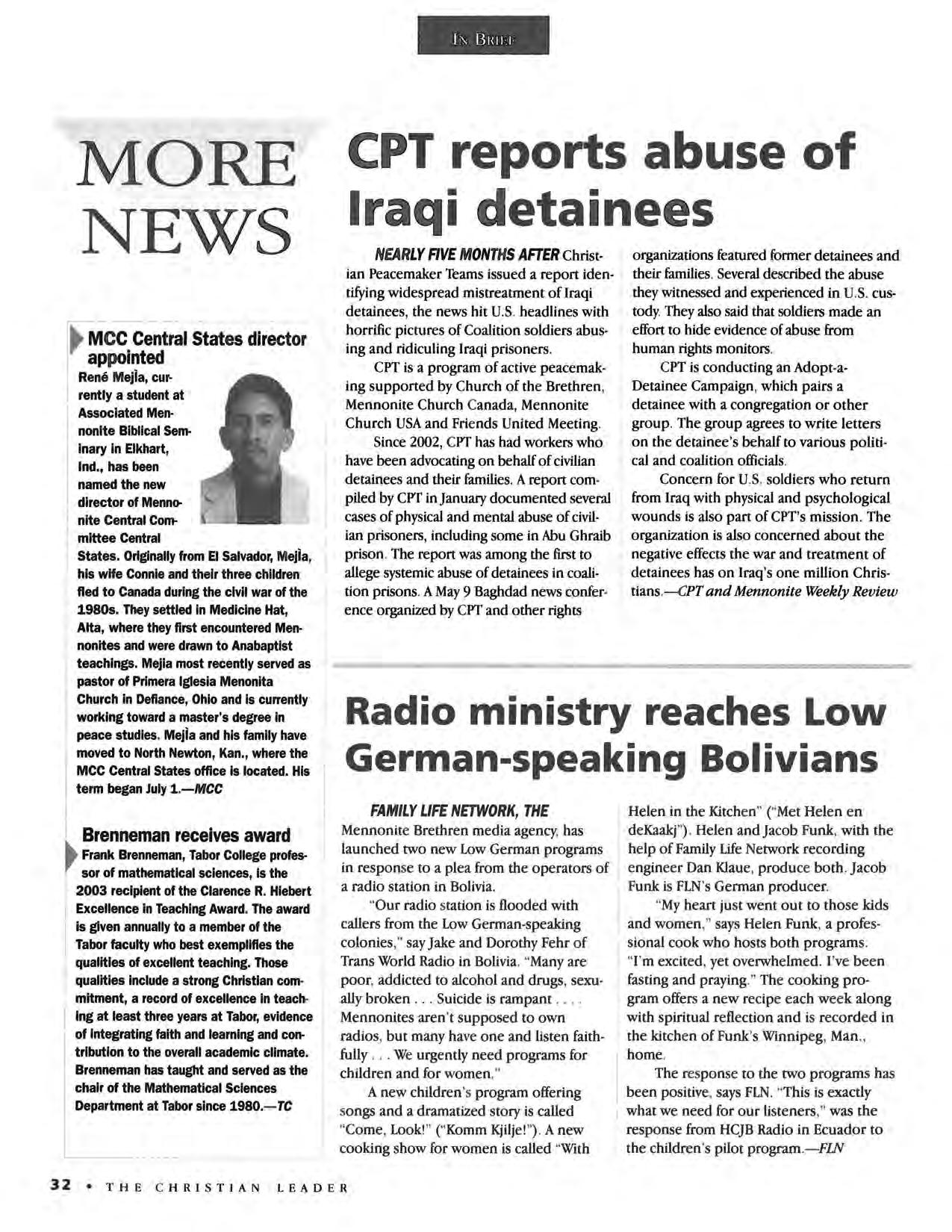
Helen in the Kitchen " ("Met Helen en deKaakj") . Helen and Jacob Funk , with the help of Family Life Network recording engineer Dan Klaue , produce both. Jacob Funk is FLN ' s German producer.
"My heart just went out to those kids and women ," says Helen Funk , a professional cook who hosts both programs ''I'm eXCited , yet overwhelmed . I've been I fasting and praying ." The cooking program offers a new recipe each week along with spiritual reflection and is recorded in the kitchen of Funk ' s Winnipeg , Man ., home
The response to the two programs has been positive , says FLN. "This is exactly what we need for our listeners ," was the response from HCJB Radio in Ecuador to the children ' s pilot program .-FLN
Littleto n, Col o (Belleview and Mischelle Gottsch were received as members Jan 25 Christopher Acker and Eric Funk were baptized and welcomed into membership May 23
Buhler, Kan - Jackie Anschutz was baptized and welcomed to membership May 9
Bakenfiel d. Ca lif. (Rosedal e)-Jon Bloomquist, Frederick Mayer, Kendle Bullman , Chandler Bullman, Vaughn Driskill, Elizabeth Driskill, Ian Driskill and Ariel Driskill were bapti zed May 2 during the Children's Day service
Ashlea Ann Sums, Jo shua Hefner, Tabitha Hefner, Jason Jay, Ricky Riddick and Terry Stevens were baptized May 12 during AWANA Awards Night.
Orland, Calif (Country Bible
Jenny Moore, Randy Royce, Frank, Ken and TJ Torres and Aaron and Caleb Townley were baptized May 16.
Bakenfield. Calif. (La urel gl en Phyllis Barker, Jaime Bryan, Dylan Floyd, Lindsay Gilreath, Andrew Johnson, Tyler Kramer, Danica Kushner, Ashlan Napier, Melonie Parks, Jay Pandol, Kortney Penrose, Kelly Ross, Alexus Soto, Shannon Vicuna and Matthew Vorhees were baptized the weekend of May 15- 16
Enid. Okla - Jay, Kirsten , Jason and Aaron Edwards were received as associate members May 23
Weatherford, Okla (Pine Acres)-Laci Cantrell, Megan Carter; Ashlynn Patee and Courtney Patee were baptized and welcomed as new members Amy Wilson jo ined by testimony May 23
Clovis, Calif. (College Community and Tim Geddert transferred their memberships from Karlsruhe Mennonite Church in Ger many
Hillsboro, Kan.- Ashley Brandt, Macy Fadenrecht, Tim Funk, Derek Hamm, Chelsey Harmon , Sarah Heidel, Andrea Jost, Zach Jost, Caitlin Re i mer, Michael Suderman, Tyler Suderman and David Vogel were baptized June 13 and welcomed into membersh i p June 27, along with Kevin & Cheryl Brandt. Celebrations
Sioux Falls. S D. (Ethiopian Bibl e Fellowship)-The newest Central District congregation dedicated their
new building May 29 When the Silver Lake (S D.) MB Church of Freeman, S D., closed last year, they donated the building to the Sioux Falls congregat ion
Eagan, Minn (Grace Church)-T he congregation has been accepted as part of the Central District Organized in 1999, the Russian congregation has an attendance of about 150 with 70 percent being new converts The express purpose of Grace is to reach the unsaved Russian community
Kingsburg. Calif - Agua Viva, an emerging MB church in Kingsburg, invited the congregation to a May 23 Mexican dinner held in the KMBC social hall Summer Movie Nights are being held every other Wednesday evening during the summer
Bakenfield. Calif (Heritage Bibl e)"Summer Quilt Nights", held for 12 weeks, gave opportunity for quilters to fellowship together and work on projects for the Mennonite Central Commi;ttee sale next year
Wich ita, Kan. (First)-"Faith 4 Life", an interactive Bible study for grades three through six. gives kids an opportunity to explore real -life issues and learn to integrate biblical truth with everyday life Each grade level is meeting for five, three-hour sessions that include a service activity A final celebration will be held i n August.
Bakenfield, Calif (Laurelglen Bi ble)" Inhabit the Praise, " a service of music and testi mony, was presented June 6 by a combined choir of Neighborhood Church of Visalia, Calif , and LBC vocalists and a full orchestra
Min istry
Eni d. Okla.-A World Impact m ission trip July 2a-Aug 1 is planned for senior high, college age and adults in Wichita, Kan Participants can choose among concrete work, pa i nting, Bible clubs-in English or Spanish, cooking or serving in the medical cl i n ic
Reedley, Calif --G rades three through six met every afternoon June 14-17 to tie quilts to be given to Mennonite Central Committee Corn. Okla - The Corn youth group is going to Fa ith Bible Church in Lawton, Okla to help with vacat ion

Bible school July 12-16. Oovis. Calif (College " Exploring God, " an opportunity to explore the Chr istian faith during dinner and discussions, was held in May and June The church's outreach commission hosted the sessions.
Enid, Okl a.- Men from the congregation gather to pray for thei r influence and impact in their workplaces The men have met per iodically at a g i ven job-sight to pray geographically for a particular individual and his work setting Chris Regier, associate pastor, shared songs he has written and the stories behind them at an evenin g service June 13
Yale. S.D (Bethel)-Pastor Tom Cartney is leading an adult summer elective which will explore issues such as music, warfare, homosexuality and gay marriage, other faiths and the uniqueness of Jesus as well as topics suggested by class members or those related to current world events
Buhler, Kan - The Christian education department is encouraging people to volunteer to teach children's Sunday school classes or serve in the nursery for one Sunday during the summer in order to give regular teaching staff a break
Uttleton, Col o (Belleview Community)- "God's Heart for the Nations" was a six-week unit in April and May. The study was part of "Belleview Blast, " a program for children kindergarten through 6th grade Activities included learning words from various languages, preparing food from other countries, art projects, prayer and studying Scripture
VISalia, Calif. (Neighborhood)-" Holy Moses," a two-week summer music camp, was held June 14-25 The camp was described as an opportunity to join the cast of "Trading Spaces" at a Hebrew home and an Egyptian pala ce to discover the story of Moses and his God Two evening performances of the musical were given at the end of the camp Collinsville. Okla (Westport)-Son Power is the result of a children's ministry vision to "grow new life in the children's department " Alliteration of Son Power, ba sed on John 1:4, emphasizes the key elements of the program : Stewardship,
Outreach, Nurture, Prayer, Ownership, Worship, Evangelism and Relationship Each of the three Sunday school departments, Sprouts, Seed Spreaders and Share Croppers, has its own key verse
Harvey, N D --C urtis Lautt is servi ng as youth minister for the summer He began May 17
Rapid City, S.D. (Bible Fellowship)-A farewell and appreciation service was held May 23 for youth pastor Mike and Diane Petts and family Lawton, Okla. (Faith couple Russell and Elizabeth Schmidt and family were commissioned by the congregation June 6. They are returning to Thailand this month to serve as MBMS International m issionaries
Omaha. Nebr. (Millard Bible)--Rod Anderson is serving as interim pastor during June and JUly.
Wichita, Kan (First)-Stacey Rhoades has resigned her staff posit ion as director of church family ministries effective Sept 1, in order to pursue full -time ministry with Free Refills International, the speaking ministry she shares with Julia Penner Zook. Rhoades ha s served the congregation for four years
Wichita, Kan.-Interim Southern District m i nister Ron Braun has accepted a position as director of development for Kindron Bethel Retirement Village in North Newton, Kan Braun completes his ministry with the SOC this month
BALnER. LOYAL, Enid, Okla , member of Enid M B Church, was born Jan 22, 1911, to John P. and Amanda Funk Baltzer, in Hillsboro, Kan., and died May 26, 2004, at the age of 93 On June 23, 1935, he married Viola M Hergert, who survives He is also survived by one daughter, Gloria and husband Dwayne Janzen of Enid; one brother Jona and wife Mary Baltzer of Moundridge, Kan ; two sisters, Lydia and husband Alfred Berg, Orpha and husband Jake Klassen , all of Reedley, Calif , one grandson and two great grandchildren
BmlN, DARRELL KEITH, Inman, Kan , member of Zoar MB Church of Inman, was born April 23, 1946, in McPherson, Kan ., to Har ry and Viola Betti n, and died May 13, 2004, at
the age of 58 He is survived by h is parents; one sister, Sharon and husband Randy Friesen of In man and one brother, Stan and w ife Elda of Lyons, Kan
EDIGER, HENRY E., En id, Okla , was born Jan 16, 1919, in Collinsville, Okla , to Henry A and Katherina Toews Ediger and died May 11. 2004, at the age of 85 On Oct 18 1949, he married Arlene M Renken who survives He is also survived by two daughters, Rebecca Thesman of Lawrence, Kan • Kristina Ediger of Enid; one son , Philip and wife Jane of Enid; two sisters, Lynda and husband Edd of Goddard. Kan • and Adina Schmidt of Fresno, Cal if ; one brother Neal Ediger of Hillsdale, Calif , and four grandchildren
FLAM ING. A RTHU R H • Hillsboro, Kan , member of Hillsboro MB Church , was born June 2, 1916, in Mountain Lake, Minn , and died May 17, 2004, at the age of 87 On Oct 3, 1939, he married Linda Claassen, who predeceased him in 2000 He is survived by two sons. Dale and Paul, and two daughters, Ruth and Beth
FRANZ. ELDON GLENN, Fresno, Calif ., was born June 14, 1934, in Corn, Okla , and d i ed May 16, 2004, at the age of 69 On July 13, 1954, he married Lois, who survives He is also survived by four sons, Brian and wife Lori of Fresno, Calif Ed of Fresno, Lyndon of La Quinta, Calif., and
Employment-Local Church
North Fresno Church (MB) of Fresno, Calif , is seeking a person to develop and lead a ministry to junior high, senior high, college students and their families by fostering relationships w ith God and others, equipping student and volunteer leaders and reaching out to the neighboring community through evangelism and service. The congregation has approximately 400 attendees in two services on a weekly basis, with a traditional style of worship in one service and a contemporary style in the other The church is located in an urban area and serves a community of diverse social, economic and ethnic students and families For a complete job announcement email Tim Neufeld at timneuf@fresno edu or visit www.northfresnochurch com
Employment-Local Chu rc h
Reedley Mennonite Brethr en Church (RMBC), Reedley, Calif., a congregation of 1,300 members is seeking a full time Minister of Music and Worship to join a multiple staff in a growing ministry setting. RMBC has two dynamic worship services each Sunday. one contemporary style and one blended style with a 90 voice choir While a person with an MA is preferred , applicants should have a mi nimum
Steve and wife Trisha of Fresno; twin brother Eugene and wife Toby of Arlington, Tex ; sister-in -law Barbara Provost of Bass Lake, Calif , nine grandchildren, two great grandchildren and one great great grandchild
GIFT, FRAN CIS H., Reedley, Calif , member of Neighborhood Church, Visalia, Calif.• was born Sept. 25, 1910, to Arthur and Anna Gift, in Pawnee Station, Kan , and died May 2,2004, at the age of 83 In 1934, he married Thelma Baldwin, who predeceased him He is survived by two sons, James and wife Charlotte of Visalia and David of Topeka, Kan ; one daughter Cara Lea and husband Bill Sickele s of Vancouver, Wash ; one brother Charles A. of Ft Scott, Kan , six grandchildren and 12 great g rand children
HEPPNER, LEONA SHELLENBERG, Medford, Ore , was born Nov, 8, 1919, to George and Mathilda Schellenberg at Waldheim, Sask , and died Feb 13, 2004, at the age of 84 She was married to Isaac Heppner, who predeceased her She is survived by two daughters, Marilyn Summers and Beverly and husband Steve Strauss; one son, Howard and wife Lois; two sisters, Dora Wirsche and Renetta Krause; two brothers, Ernie and Ben Schellenberg, seven grandchildren and five great grandchildren.
JOST, MARIE E. FRANZ, Hillsboro, Kan , member of Parkview M.B Church of Hillsboro, was born April 26, 1915, to David J. and TIna Reimer Franz on the family farm in McPherson County, Kan , and died June 17, 2004, at the age of 89. On April 25, 1943, she married Harold B Jost, who survives She is also survived by two sons, Howard and wife Shanti of Calcutta, India, and Loren and wife Katy of Riverton , Wyo .; two daughters, Annette and husband Wayne Albrecht of Richardson, Tex ., and Christine and husband Sid Harms of San Mateo, Calif ; two sisters, Margaret Ratzlaff and Rubena Suderman; one brother, Bob Franz, and nine grandchildren
KLINGE NBERG, HERM AN, Reedley, Calif , was born Ma rch 13, 1920, to Herman and Elisabeth Klingenberg in Danzig, Germany, and died May 16, 2004, at the age of 84 On July 6, 1945, he married Velma Regier, who survives He is also survived by one son, Eddie and wife Candy; one daughter, Myrna and husband Vic Quinn ; two brothers, Willie of Peabody, Kan , and John of Turlock, Calif , three grandchildren and five great grandchildren
NICKEL. AM ANDA 5. JANZEN, "Bobbie, " Reedley, Calif , of Reedley MB Church, was born Jan 23, 1911, in Janzen, Neb., and died Dec. 5,
of five years of experience in music leadership and broad strengths that reflect the variety in church music today For details and a job description send resume to : Pastor Dennis Fast, 1362 L St , Reedley CA, 93654 or dennis@reedleymbc org
Employm e nt-Local Church
New Hope Church of the Mennonite Brethren seeks a candidate for part -time pastoral position It is currently a small church with an attending congregation of 20-30 This core group is committed to continuing a 40 -year presence in the New Hope community The focus of the pastor will be to create an environment where our church and community are faced with the person and call of Jesus Chr ist upon their lives; to provide inspirational. spiritual leadership to energize the existing core group and involve them in reaching the surrounding community; and to partner with and be responsible to the core group to organize and coordinate the ministries of the church Interested individuals ar e invited to contact the church moderator Vern Schultz at vbschultz@juno com or 763 -4251642
2003, at the age of 92 She was predeceased by husbands, Nick Janzen and Wesley Nickel. She is survived by two daughters, Marilyn and husband Mike Loria of Surprise, Ariz., and Gracie and husband John Steinborn of Clovis, Calif.; two sons, Vernon and wife Shirley of Fresno, calif. , and Francis and wife Waneta of Reedley, 10 grandchildren and five great grandchildren
PETERS. TILLIE, Reedley, Calif, member of Reedley MB Church was born Sept 7, 1916, to Martin and Anna Barkman, in Weatherford, Okla ., and died May 27, 2004, at the age of 84 On April 2, 1943, she married Henry Peters, who predeceased her. She is survived by two sons, Jim and Ken Peters; one daughter, Lori Peters Joo and three grandchildren and four great grandchildren
RATZLAFF. EDNA LORENE REIMER, Hillsboro, Kan , was born July 10, 1923, in Corn, Okla , to David and Martha Reimer, and died May 3, 2004, at the age of 80. On Jan 26, 1943, she was married to John C. Ratzlaff, who survives and with whom she served in the Belgian Congo and various pastorates in Kansas She is also survived by four sons, Don and wife Marilyn, Glenn and wife Pamela, John, Jim and wife Cheryl, 13 grandchildren and 20 great grandchildren
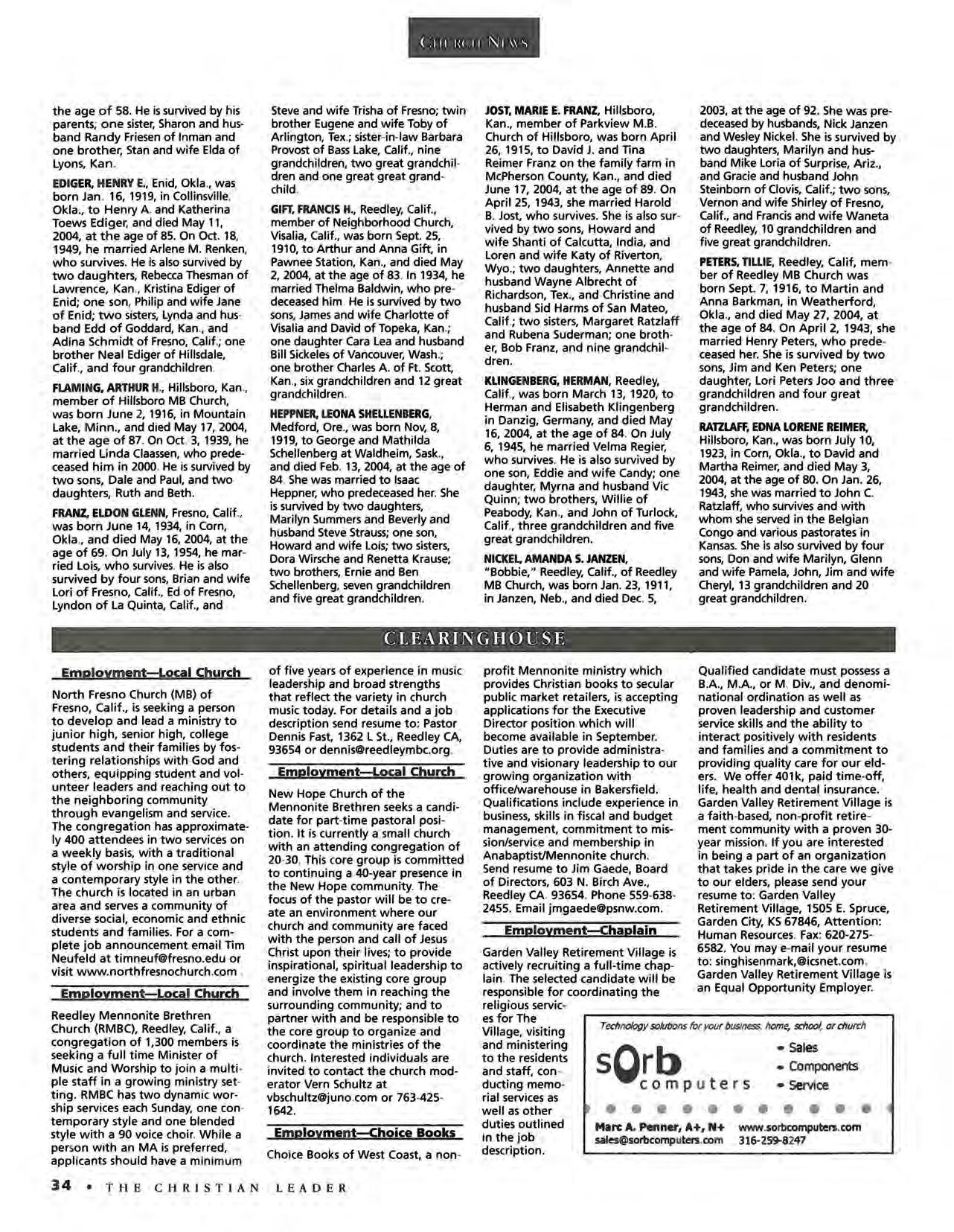
profit Mennonite ministry which provides Christian books to secular public market retailers, is accepting applications for the Executive Director position which will become available in September. Duties are to provide administrative and visionary leadership to our growing organization with off ice/warehouse in Bakersfield Qualifications include experience in business, skills in fiscal and budget management, commitment to mission/servi ce and membership in Anabaptist/Mennonite church. Send resume to Jim Gaede, Board of Directors, 603 N Birch Ave , Reedley CA 93654 Phone 559 -6382455 Email jmgaede@psnw com
Garden Valley Retirement Village is actively recruiting a full-time chaplain The selected candidate will be responsible for coordinating the religious servic-
Qualified candidate must possess a BA, MA, or M Div , and denominational ordination as well as proven leadership and customer service skills and the ability to interact positively with residents and families and a commitment to providing quality care for our eiders. We offer 401k, paid time -off, life, health and dental insurance. Garden Valley Retirement Village is a faith -based, non -profit retirement community with a proven 30year mission If you are interested in being a part of an organization that takes pride in the care we give to our elders, please send your resume to : Garden Valley Retirement Village, 1505 E Spruce, Garden City, KS 67846, Attention: Human Resources Fax : 620-2756582 You may e-mail your resume to: singhisenmark,@icsnet.com Garden Valley Retirement Village is an Equal Opportunity Employer.
Every year, we receive news of new "sunrises" created by the thoughtful planning of individuals who include their favorite charities in their estate plans and wills. These gifts appear on the horizon as beautiful expressions of a new day for these charities.
For example, consider Martha Esther Bartel of Enid, Oklahoma. Thanks to thoughtful charitable gift and estate planning, three ministries she prayed for and highly valued benefited from gifts exceeding $800,000 upon her death in March of 2002.
These gifts are indeed like sunlight to Corn Bible Academy (Corn OK), Oklahoma Bible Academy (Enid OK), and MBMS International (Fresno CA). They provide the warm and comforting knowledge that financial resources are available as they fulfill their God-given mission.
Esther was born in 1911 near Corn, Okla. At the age of thirteen she accepted the Lord Jesus Christ as her personal Savior, was baptized, and became a member of Corn Mennonite Brethren Church. Later she would become a member of the Enid Mennonite Brethren Church.
Throughout her life, Esther touched the lives of many people. She taught and influenced many students at Corn Bible Academy, Oklahoma Bible Academy, Enid Public Schools, Bacone College and Phillips University. She also accepted several young people into her home while they were pursuing their college education. She gave strong encouragement to young people to consider the ministry or missionary service as their calling from God. One of her pastors stated, "Esther was the first person (as a VBS teacher) to challenge me to consider the call of God upon my life."
E sther served her church and her Lord as a Sunday School superintendent, organist, and was a member of various committees. She also served for a period of time as music director in an Indian Baptist mission. Esther was also involved in a variety of educational associations, the local Chamber of Commerce, and other community organizations.
Mennonite Brethren Foundation was privileged to assist Esther in reviewing options to fulfill her charitable intent. Several years ago, Esther gifted a piece of land to Mennonite Brethren Foundation in exchange for a life income through a charitable gift annuity. The increase in income from the annuity over the net-farm income resulted in a win-win situation for her and the ministries, which would ultimately benefit from her gift. As a result of the grace of giving and good investment practices by her trustee, her estate grew. At the sunset of Esther's life, gifts in excess of $800,000, from a gift annuity and bequest, provided a new "sunrise" for three charities
Would you like to paint a sunrise at the sunset of your life? It is as simple as including the correct language in your will, or utilizing one of many charitable gifting options available through Mennonite Brethren Foundation, where we look forward to encouraging and assisting individuals in faithful stewardship for the benefit of Mennonite Brethren and MB organizations. 315 S Lincoln, P.O. Box 220
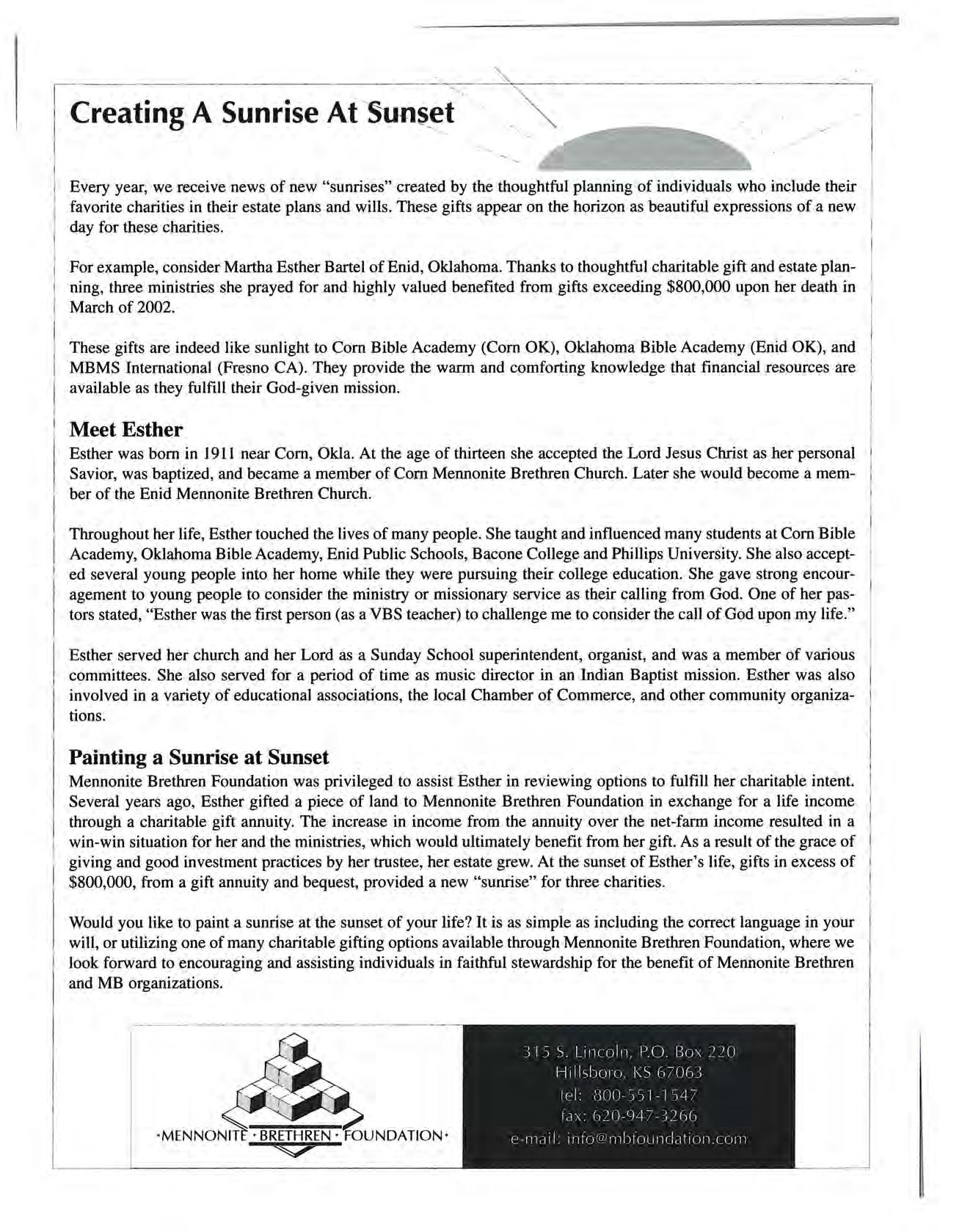
e-mail: info@mbfoLillciation.com
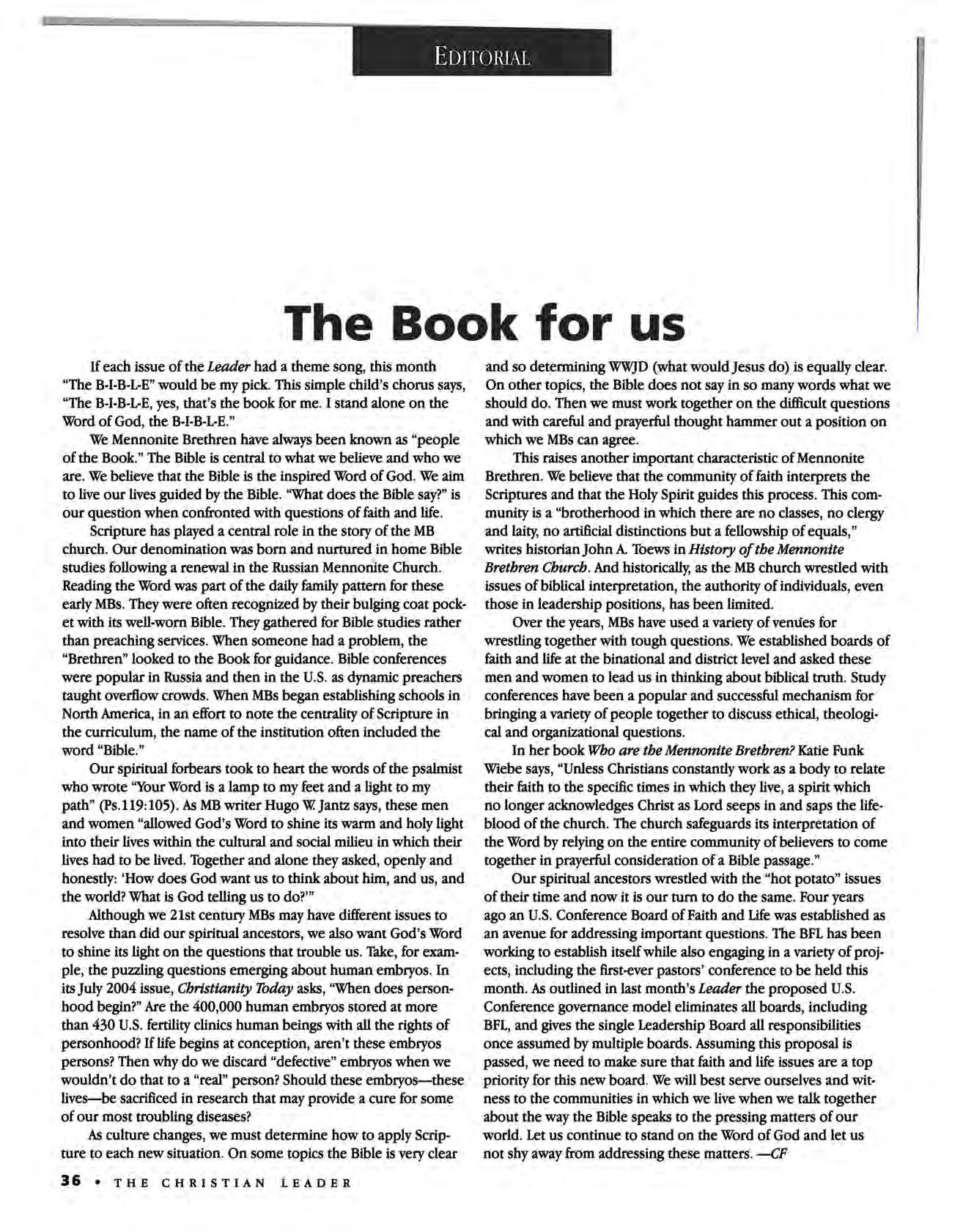
H each issue of the Leader had a theme song, this month "The B-I-B-L-E" would be my pick. This simple child's chorus says, "The B-I-B-L-E, yes, that's the book for me. I stand alone on the Word of God, the B-I-B-L-E."
We Mennonite Brethren have always been known as "people of the Book." The Bible is central to what we believe and who we are. We believe that the Bible is the inspired Word of God. We aim to live our lives guided by the Bible. ''What does the Bible say?" is our question when confronted with questions of faith and life.
Scripture has played a central role in the story of the MB church. Our denomination was born and nurtured in home Bible studies follOwing a renewal in the Russian Mennonite Church. Reading the Word was part of the daily family pattern for these early MBs. They were often recognized by their bulging coat pocket with its well-worn Bible. They gathered for Bible studies rather than preaching services. When someone had a problem, the "Brethren" looked to the Book for guidance. Bible conferences were popular in Russia and then in the U.S. as dynamic preachers taught overflow crowds. When MBs began establishing schools in North America, in an effort to note the centrality of Scripture in the CUrriculum, the name of the institution often included the word "Bible."
Our spiritual forbears took to heart the words of the psalmist who wrote ''Your Word is a lamp to my feet and a light to my path" (ps.119: 105). As MB writer Hugo W Jantz says, these men and women "allowed God's Word to shine its warm and holy light into their lives within the cultural and social milieu in which their lives had to be lived. Together and alone they asked, openly and honestly: 'How does God want us to think about him, and us, and the world? What is God telling us to do?'"
Although we 21st century MBs may have different issues to resolve than did our spiritual ancestors, we also want God's Word to shine its light on the questions that trouble us. Take, for example, the puzzling questions emerging about human embryos. In its July 2004 issue, Christianity Today asks, "When does personhood begin?" Are the 400,000 human embryos stored at more than 430 U.S. fertility clinics human beings with all the rights of personhood? H life begins at conception, aren't these embryos persons? Then why do we discard "defective" embryos when we wouldn't do that to a "real" person? Should these embryos-these lives-be sacrificed in research that may provide a cure for some of our most troubling diseases?
As culture changes, we must determine how to apply Scripture to each new situation. On some topics the Bible is very clear
and so determining WWJD (what would Jesus do) is equally clear. On other topics, the Bible does not say in so many words what we should do. Then we must work together on the difficult questions and with careful and prayerful thought hammer out a position on which we MBs can agree .
This raises another important characteristic of Mennonite Brethren. We believe that the community of faith interprets the Scriptures and that the Holy Spirit guides this process. This community is a "brotherhood in which there are no classes, no clergy and laity, no artificial distinctions but a fellowship of equals," writes historian John A. Toews in History of the Mennonite Brethren Church. And historically, as the MB church wrestled with issues of biblical interpretation, the authority of individuals, even those in leadership positions, has been limited.
Over the years, MBs have used a variety of venues for wrestling together with tough questions. We established boards of faith and life at the binational and district level and asked these men and women to lead us in thinking about biblical truth. Study conferences have been a popular and successful mechanism for bringing a variety of people together to discuss ethical, theolOgical and organizational questions.
In her book Who are the Mennonite Brethren? Katie Funk Wiebe says, "Unless Christians constantly work as a body to relate their faith to the specific times in which they live, a spirit which no longer acknowledges Christ as Lord seeps in and saps the lifeblood of the church. The church safeguards its interpretation of the Word by relying on the entire community of believers to come together in prayerful consideration of a Bible passage."
Our spiritual ancestors wrestled with the "hot potato" issues of their time and now it is our turn to do the same. Four years ago an U.S. Conference Board of Faith and Life was established as an avenue for addressing important questions. The BFL has been working to establish itself while also engaging in a variety of projects, including the first-ever pastors' conference to be held this month. As outlined in last month's Leader the proposed U.S. Conference governance model eliminates all boards, including BFL, and gives the single Leadership Board all responsibilities once assumed by multiple boards. Assuming this proposal is passed, we need to make sure that faith and life issues are a top priority for this new board We will best serve ourselves and witness to the communities in which we live when we talk together about the way the Bible speaks to the pressing matters of our world. Let us continue to stand on the Word of God and let us not shy away from addressing these matters. -CF